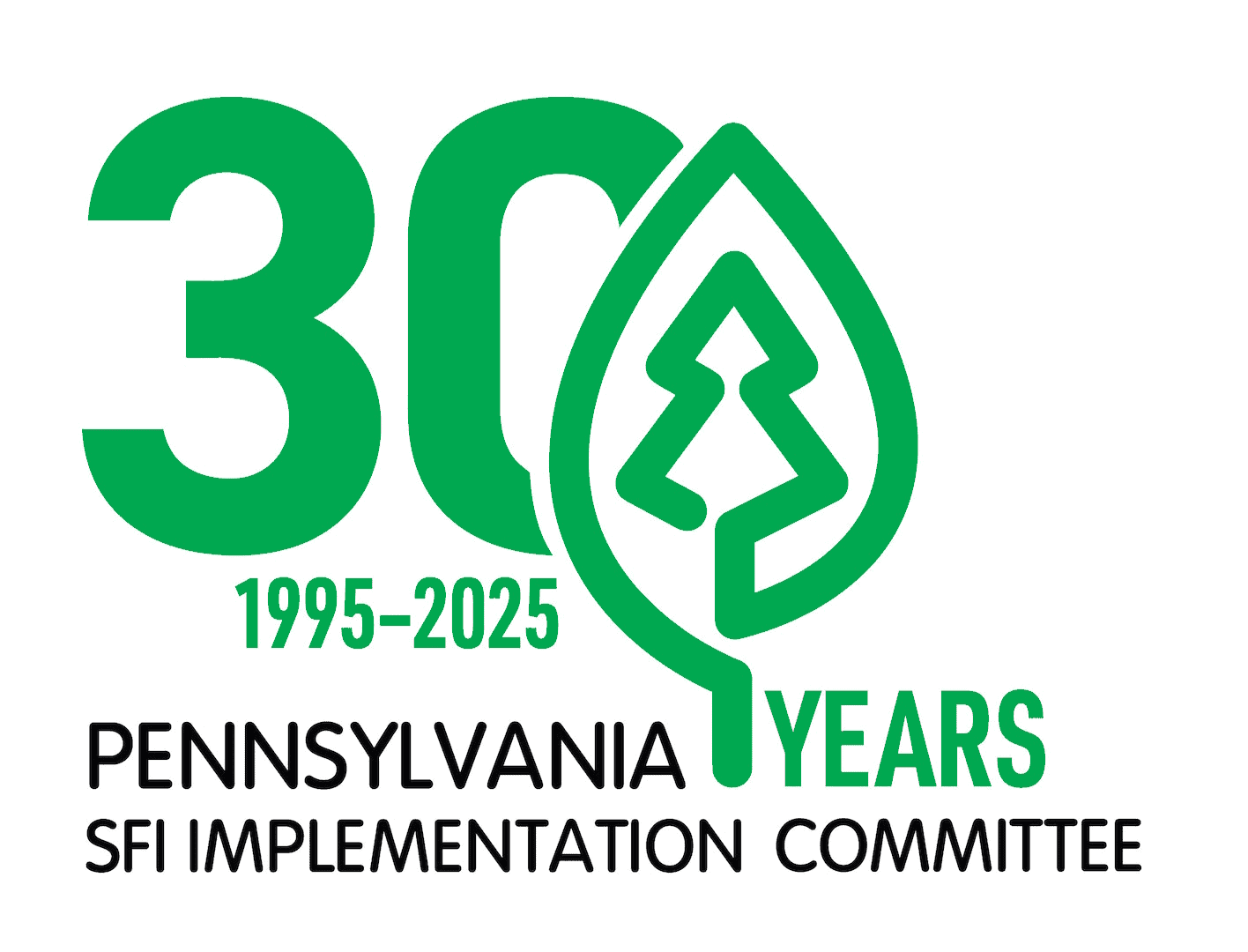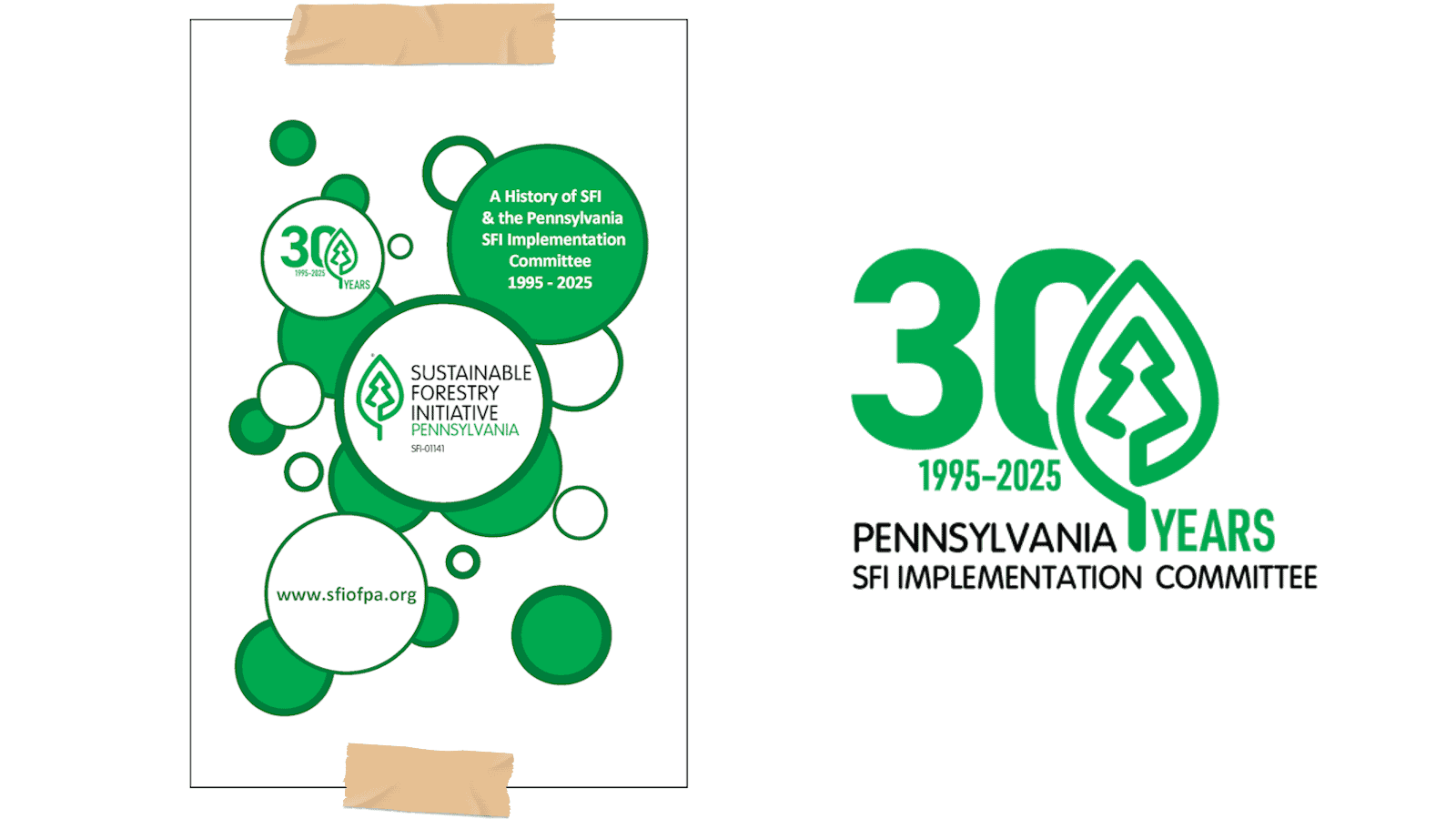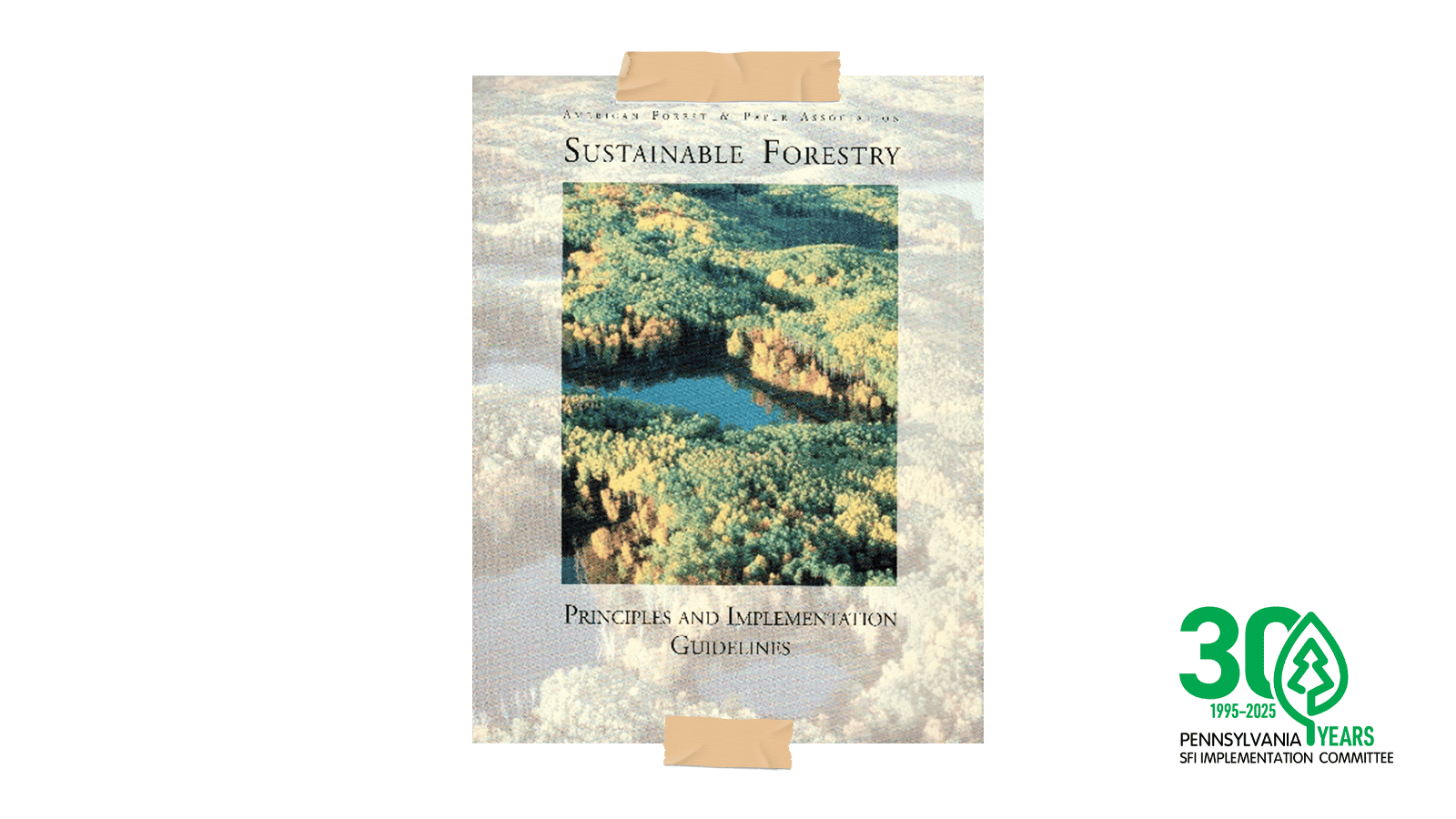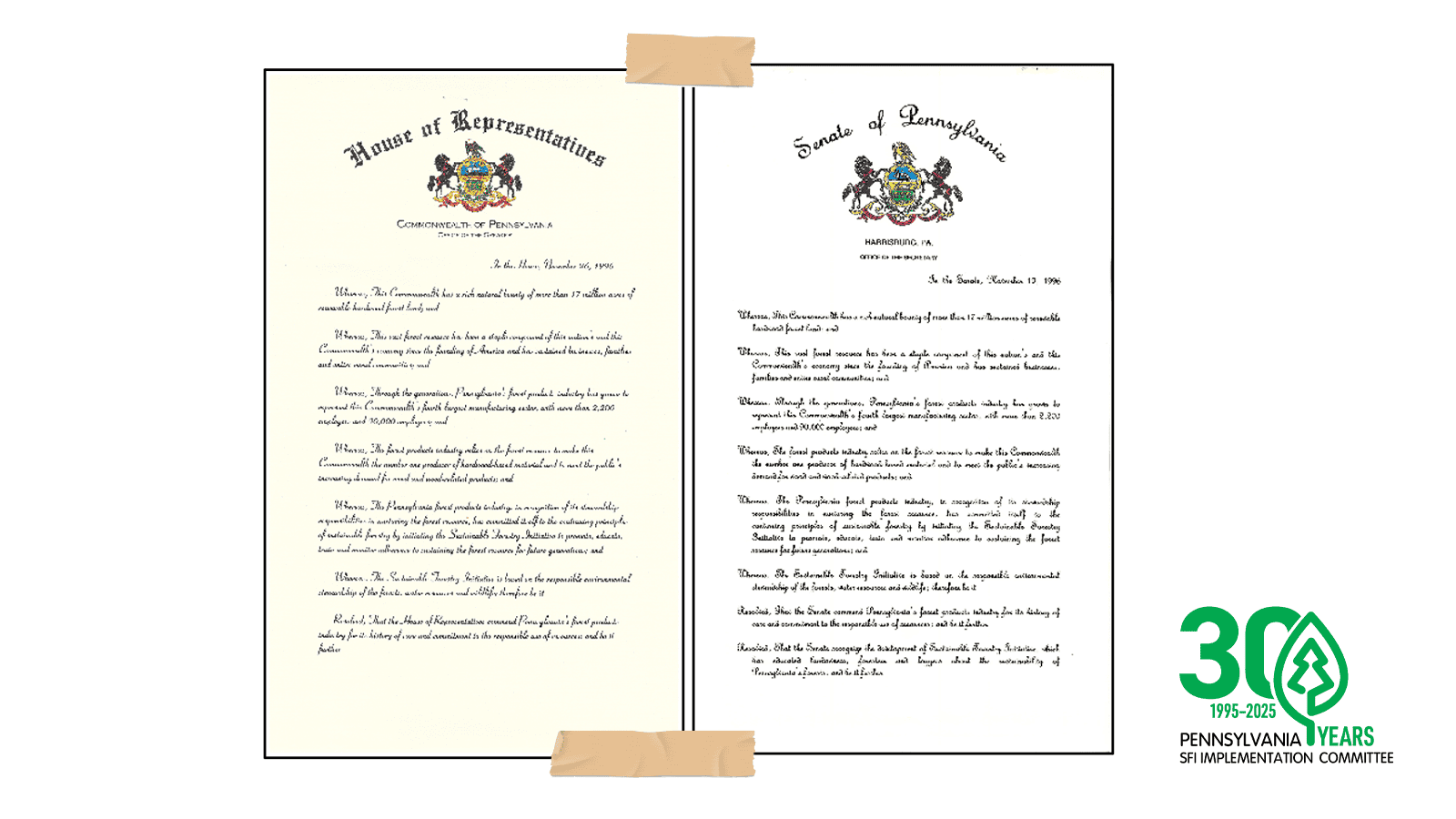Our History
Home » Our History

A LEGACY ROOTED IN PEOPLE, PURPOSE, AND THE PLANET
At first glance, the name Sustainable Forestry Initiative may seem to suggest a focus solely on trees and timber, but at its core, our story is about people coming together to answer one of humanity’s most pressing questions: “How can we live off the resources of this earth without degrading them?”
SFI is a testament to the power of community, vision, and collective action. It’s a story of forward-thinking leaders in the forest products industry who, decades ago, recognized the need for change. They understood that true sustainability wasn’t just about conservation — it was also about people. It was about ensuring that communities, workers, and ecosystems could thrive together, and not just for today, but for generations to come.
SFI’s journey is a powerful reminder that when people come together with purpose and passion, they can turn challenges into opportunities. It’s a call to action for all of us — to recognize the value of our natural world, to utilize forests responsibly, and to work collaboratively towards a sustainable future
Download Our History Booklet
We invite you to download A History of SFI & The Pennsylvania SFI Implementation Committee 1995–2025 to learn more about the history and progress of the Sustainable Forestry Initiative in Pennsylvania and beyond. Simply click on the image above to download a copy of the publication.

Early History
In the past, forest product companies owned and managed forests primarily for a simple economic objective – — profit from timber production. As the U.S. economy roared through the 1950s and 1960s, companies used their ingenuity and experience with sound forest management to meet the country’s ever-increasing demand for wood products, generating economic activity that supported local industries and communities.
However, evolving public concerns began to be raised about whether forest products companies were considering the impacts arising from their activities. A number of new terms entered the popular vocabulary — terms like biodiversity, habitat conservation, and ecosystem services. The prevailing management policy shifted from “sustained yield forestry,” which emphasized maintaining a constant flow of timber from the forest, to “sustainable forestry,” which sought to sustain all forest values, including non-timber values such as wildlife habitat and water quality.
In the 1980s, the public and organized environmental interest groups had become increasingly concerned about the effect forest products companies, particularly the large industrialized forest-products companies in the U.S., were having on the environment. The forest products industry was realizing at the time that it had a credibility problem. It was viewed as part of the problem rather than part of the solution. In response, the US forest products industry launched a series of initiatives in the early 1990s to improve transparency and sustainability.
In October 1990, the American Forest Council, an education and outreach organization that supplemented the lobbying activities of the American Paper Institute (API) and the National Forest Products Association (NFPA), convened a “Future of Forestry Conference” to examine public concerns regarding management of private forests. A task force was formed to develop specific recommendations for improving forestry practices across the forest products industry. At the same time, API was crafting a set of environmental, health, and safety principles for pulp and paper manufacturing. These efforts eventually converged and on May 12, 1992, API adopted a set of 10 Forest Management Principles, drawing influence from global sustainability efforts such as the 1987 Bruntland Commission’s report on sustainable development (“Our Common Future”) and the 1992 Earth Summit Principles of Forest Management. The new API principles, and their required adoption by all API members, laid the foundation.
NFPA also commissioned public opinion research in February 1992 to assess perceptions of the forest product industry’s forest management practices. The study revealed a significant perception gap between industry leaders and other influential groups, such as politicians, media, academia, and environmental organizations. While industry CEOs believed their weakness in public support stemmed from poor communications, other groups saw it as a behavioral issue that was undermining their credibility.
API merged with NFPA on January 1, 1993 to form the American Forest & Paper Association (AF&PA), and the following year launched a nationwide, collaborative effort with industry leaders, foresters, and stakeholders to develop and refine a strategic plan to improve the credibility of the industry. The program that evolved, the cornerstone of the strategic plan, was the Sustainable Forestry Initiative (SFI), a “proof-of-performance” program that would “visibly improve industrial forest practices and report results.”
1995
SFI Principles & Guidelines
After being approved by the AF&PA Board of Directors on October 14, 1994, the new SFI Program was officially rolled out on January 1, 1995. The heart of the program was the “Sustainable Forestry Principles and Implementation Guidelines” that represented, in writing, the industry’s commitment to fundamentally improve. The guidelines established clear objectives and performance measures by which the public could evaluate whether AF&PA members were meeting their commitments. Click on the image above to view the original guidelines.
The Principles and Guidelines were introduced to members as “…working documents, open to occasional revision and modification as we improve our understanding of both forest management and program implementation.“
The American Forest & Paper Association’s 425 members, at the time, accounted for approximately 85% of the paper production, 50% of the solid wood production, and 90% of the industrial forestlands in the United States. Compliance with the SFI Guidelines became a condition of continued membership in AF&PA on January 1, 1996. As a testament to their commitment to the SFI Program, the Association suspended the membership of 17 non-compliant companies that year. At the time, AF&PA spokesman Luke Popovich stated “If this were simply a PR gimmick, we wouldn’t be losing members over it.”
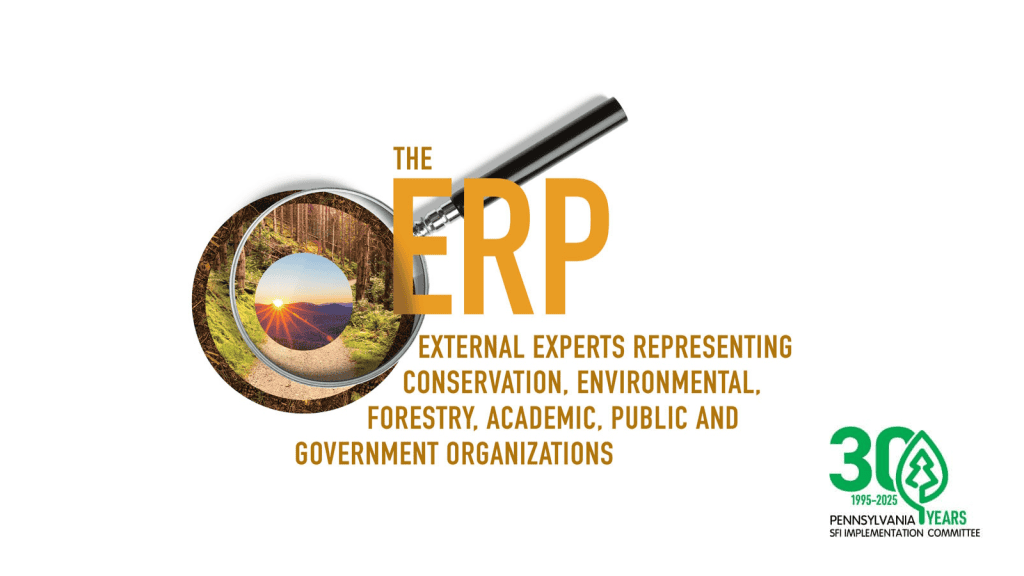
1995
The Expert Review Panel
As the SFI Program was being established in 1995, the AF&PA Board of Directors formed the Independent Expert Review Panel (renamed External Review Panel in 2001), a diverse group of outside forestry experts that were invited to voluntarily provide external quality control for the SFI Program, and advise the AF&PA Board of Directors on appropriate changes to help SFI achieve its mission. Panel members included representatives from conservation, academic, professional, and government organizations. A strong effort was made to empanel a group of experts that was above reproach.
The Expert Review Panel was challenged to observe whether: 1) the program defined what would constitute responsible, sustainable forestry first in the United States, and later in Canada; 2) the responsible forestry practices reported to the public were valid (independent third-party auditing would be added later); and 3) there were consequences for those who either would not participate in the new forestry approach that was proposed, or who said they were doing good work but were proven to be doing otherwise.
In their first annual report the Panel stated, “We are convinced that the SFI is designed to achieve a genuine behavioral change in America’s commercial forestry practices, and that the effects will be both significant and positive for the future of America’s forest.” In their second annual report they asserted, “those panel members who have been involved throughout the process have become convinced that the majority of the forest products industry has genuinely committed to achieving the goals of the SFI.”
In 1997, the Panel adopted an independent operating charter and began to select its own membership and develop its own agenda to represent the public interest as an outside observer of the SFI Program.
Former State Forester and Director of the Pennsylvania Bureau of Forestry (1994 to 2007), Jim Grace, served as a member of the SFI External Review Panel from 2001 to 2008.
Today, the SFI External Review Panel continues to provide ongoing independent review of SFI and its work (https://sfierp.org/).
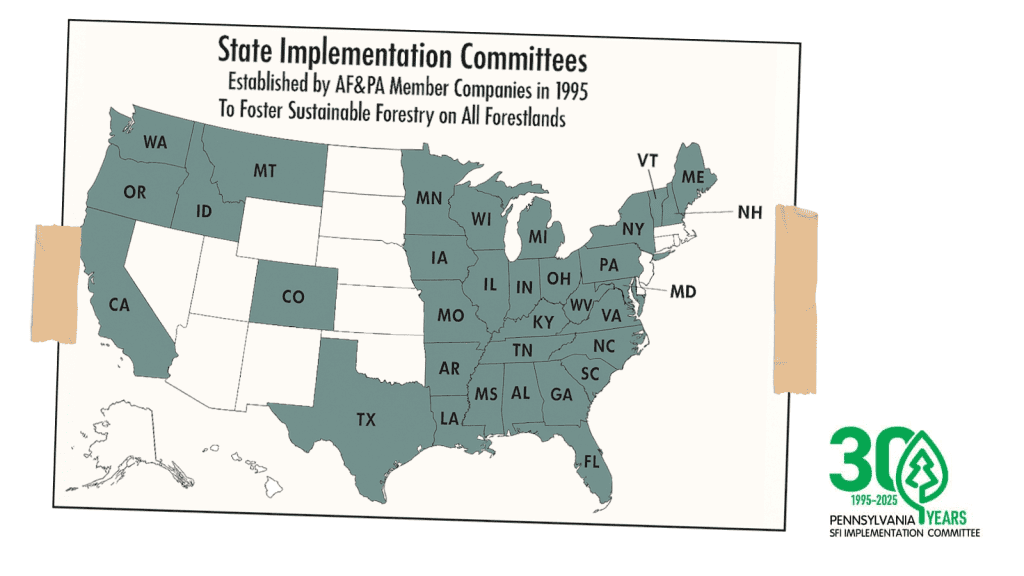
1995
Implementation Committees
Originally referred to as “state groups” in the Guidelines (Objective 10), AF&PA Members began to form “State Implementation Committees” made up of diverse stakeholders that could provide a more locally focused approach for implementing the SFI Program across a wide variety of forest types and regional conditions in the United States. The Committees were made up of local AF&PA members and a diversity of volunteers that carried out the work of SFI in addition to their regular duties. By involving a variety of local stakeholders and experts, the Implementation Committees helped ensure that the SFI Program was both rigorous and adaptable to different contexts. This grassroots network of Committees, unique to SFI among existing forest certification systems, allowed the program to be more responsive to local concerns and build greater trust with stakeholders by fostering collaboration between groups with differing perspectives and opinions on managed forests. Today, nearly 1,000 people comprise the 35 SFI Implementation Committees that operate across the United States and Canada.

1995
Pennsylvania's Implementation Committee
The Pennsylvania SFI Implementation Committee was formed in 1995, and became “housed” within the Hardwood Lumber Manufacturers Association of Pennsylvania (now the Pennsylvania Forest Products Association) the following year.
The Pennsylvania SFI Implementation Committee met for the very first time on June 2, 1995, at the South Ridge Motor Inn (presently defunct) in State College. It was co-chaired by John Skovran of Procter & Gamble and David Haag of International Paper. Although they were an SFI Implementation Committee, the group started under the name “Pennsylvania Forest Sustainability Committee” and quickly pivoted to “Forest Industry Committee for Sustaining Pennsylvania Forests.” On November 14, 1996, the members decided that the program should operate under the name “Sustainable Forestry Initiative of Pennsylvania” and the Committee became the “SFI of PA State Implementation Committee.”
Like other Implementation Committee’s, the early focus was on the difficult work of establishing itself as an organization, generating operating funds, building broad support, and developing the collaborative programming that would achieve the new SFI Guidelines – specifically, logger training and forest landowner outreach.
The Implementation Committees were, and still are, completely self-funded. They receive(d) no direct financial support from AF&PA or SFI Inc. Pennsylvania’s forest products industry therefore backed their commitment to SFI by providing the operating funds for the developing Implementation Committee, and they continue to be the primary source of financial support from the Pennsylvania Implementation Committee today.
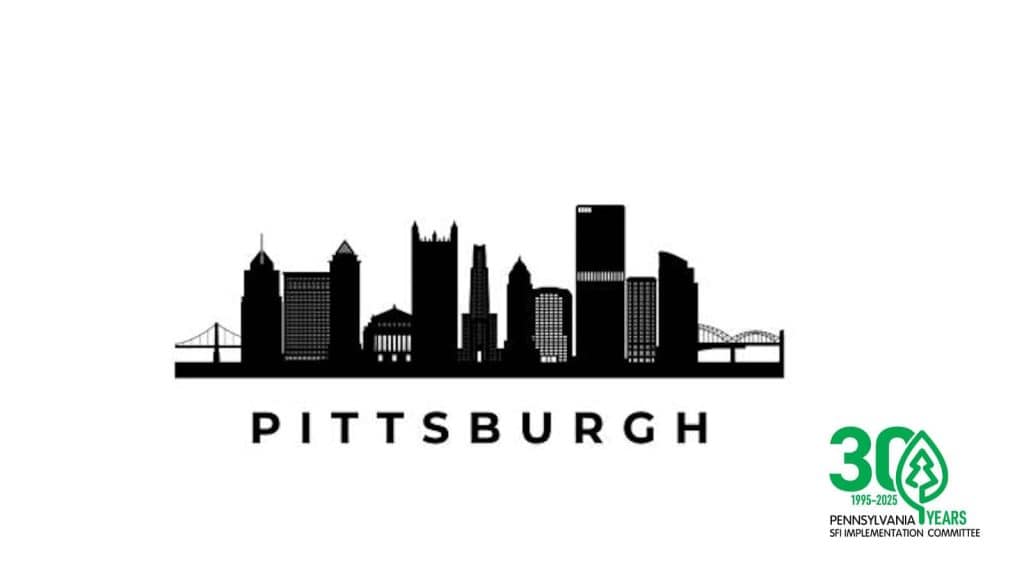
1996
First SFI Annual Conference
Pittsburgh hosted the very first SFI annual conference on August 6-7. Over 60 representatives from State Implementation Committees, industry, associations, the Expert Review Panel, the SFI Implementation Task Force, and the Tree Farm Program gathered for the two days to learn from each other and assess state-level progress of implementing the new SFI Guidelines. This was the first time national and state representatives met to discuss the success and challenges each faced.
In addition to this meeting, many early SFI planning and strategy meetings were held at Grey Towers National Historic Site in Milford, PA.

1996
Pennsylvania's First Program Manager
Pennsylvania became the first Implementation Committee in the country to hire a full-time staff member to coordinate its operations and programming when Ken Manno was brought on as the Program Manager in September 1996. Shortly after, an office was established in State College. Ken coordinated the massive undertaking of establishing the program in Pennsylvania from scratch and gaining support among numerous stakeholders.
1996
Pennsylvania Government Endorsement
The Pennsylvania General Assembly, both the Senate and the House, became the first state legislature in the nation to adopt resolutions that “endorse the Sustainable Forestry Initiative and its self-regulatory objectives of increasing knowledge, professionalism, and stewardship that will foster the sustainability of Pennsylvania’s forests…” and advocated for the program’s support.
Click on the images above to read the resolutions.

1996
Logger Training & Education
From the very beginning, the SFI Guidelines required that AF&PA members fully commit to logger education programs. In fact, logger training and education programs were required to be in place by January 1, 1996.
In Pennsylvania, the Implementation Committee understood that the most significant impact on forest sustainability was timber harvesting. Data indicated that only about 20% of harvesting decisions involved foresters working with landowners, meaning that 80% of harvesting decisions were being made with the advice of loggers. Consequently, the Implementation Committee worked intensely on developing basic training programs for loggers.
Fortunately, the PA SIC had the benefit of building off a preexisting logger training program at the time. In 1989, NORTIM (derivation of Northern Timberlands) Corporation, a provider of workers compensation for loggers, formed the Timber Harvesting Council (THC) of Pennsylvania, a nonprofit organization, to teach professional loggers safe, efficient and ecologically sound timber harvesting practices. In the early 1990s, the organization developed the “Pennsylvania Timber Harvesting Certification Program” with courses in erosion and sedimentation control, logging in wetlands, forest ecology and forest silviculture. In 1994, the program won the prestigious Three Rivers Environmental Award for excellence in advancing environmental quality in western Pennsylvania. Twelve hundred loggers received training under the THC program. In 1997, the PA SIC took over THC’s training program.
Pennsylvania’s SFI training began in full force in 1997, after courses were developed and pilot tested during the two previous years. Early on, the training program was very fluid as it continually grew and evolved. Five programs were initially developed and included courses in logging safety, environmental logging, sustainable forestry, business management, and first aid/CPR. Continuing Education courses were later included to further participants’ proficiency in specific areas and to keep them involved in the program.
Today, more than 8,000 loggers, foresters, landowners, and other natural resource professionals and stakeholders have participated in training through the Pennsylvania SFI Implementation Committee. SFI continues to be the only certification program in the world that trains loggers and helps them become better at doing their jobs on the ground.
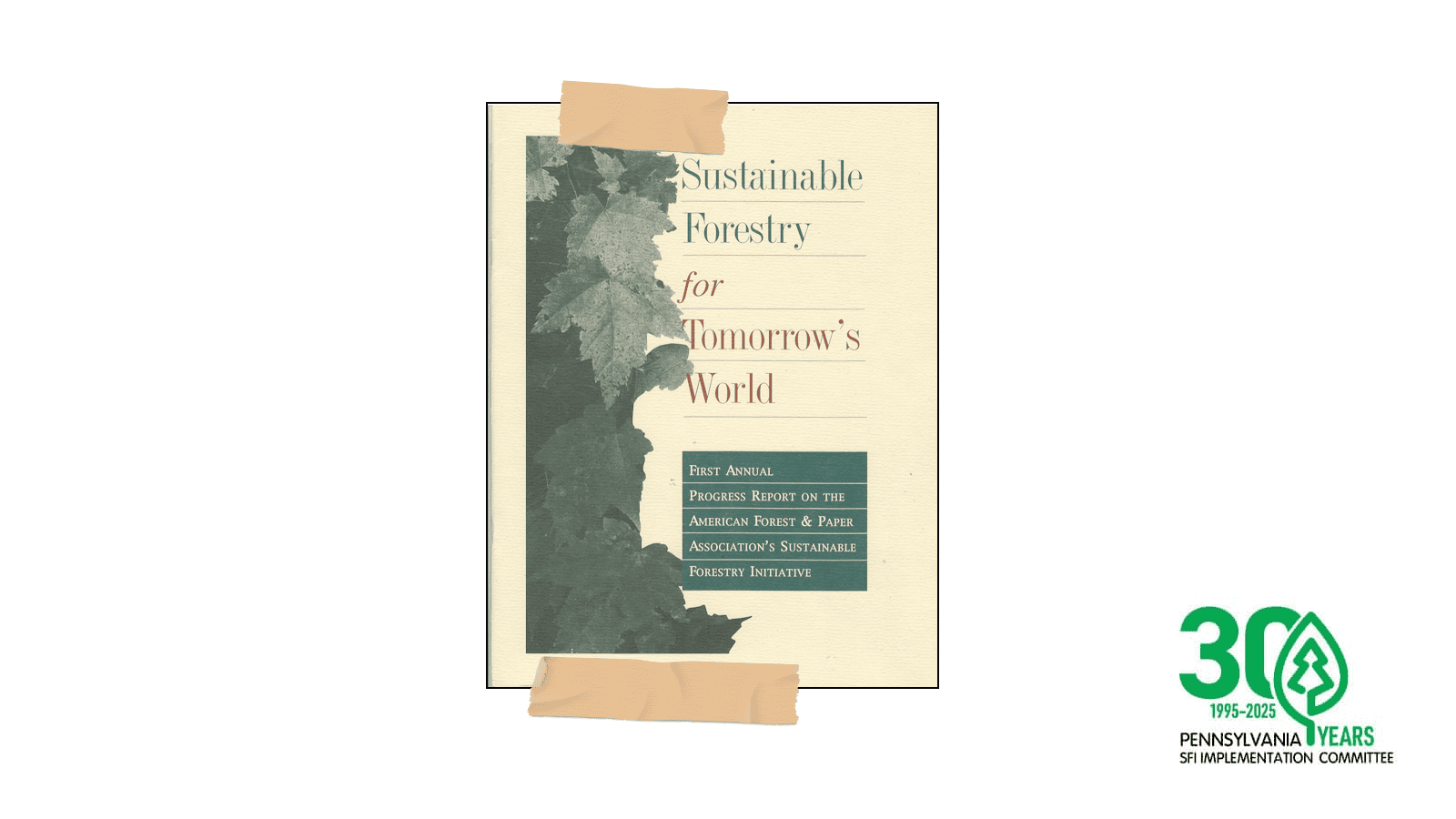
1996
First Annual SFI Progress Report
AF&PA issued its first Annual Progress Report on the SFI Program titled “Sustainable Forestry for Tomorrow’s World”. These annual reports represented AF&PA’s commitment to be open and transparent with the public about the progress and performance of its membership’s compliance with the SFI Guidelines and Principles. The reports presented aggregated information that members were required to submit to AF&PA describing their progress in implementing the SFI Program.
The Expert Review Panel was tasked with verifying that the aggregated progress data reported by the SFI program managers in the annual reports were accurately analyzed and presented each year, and to make their candid views known to the public. The Panel spent many hours reviewing methods, results, and the interpretation of those results. When all were assured that the information in the annual progress report was as accurately and honestly presented as possible, the text went to press.
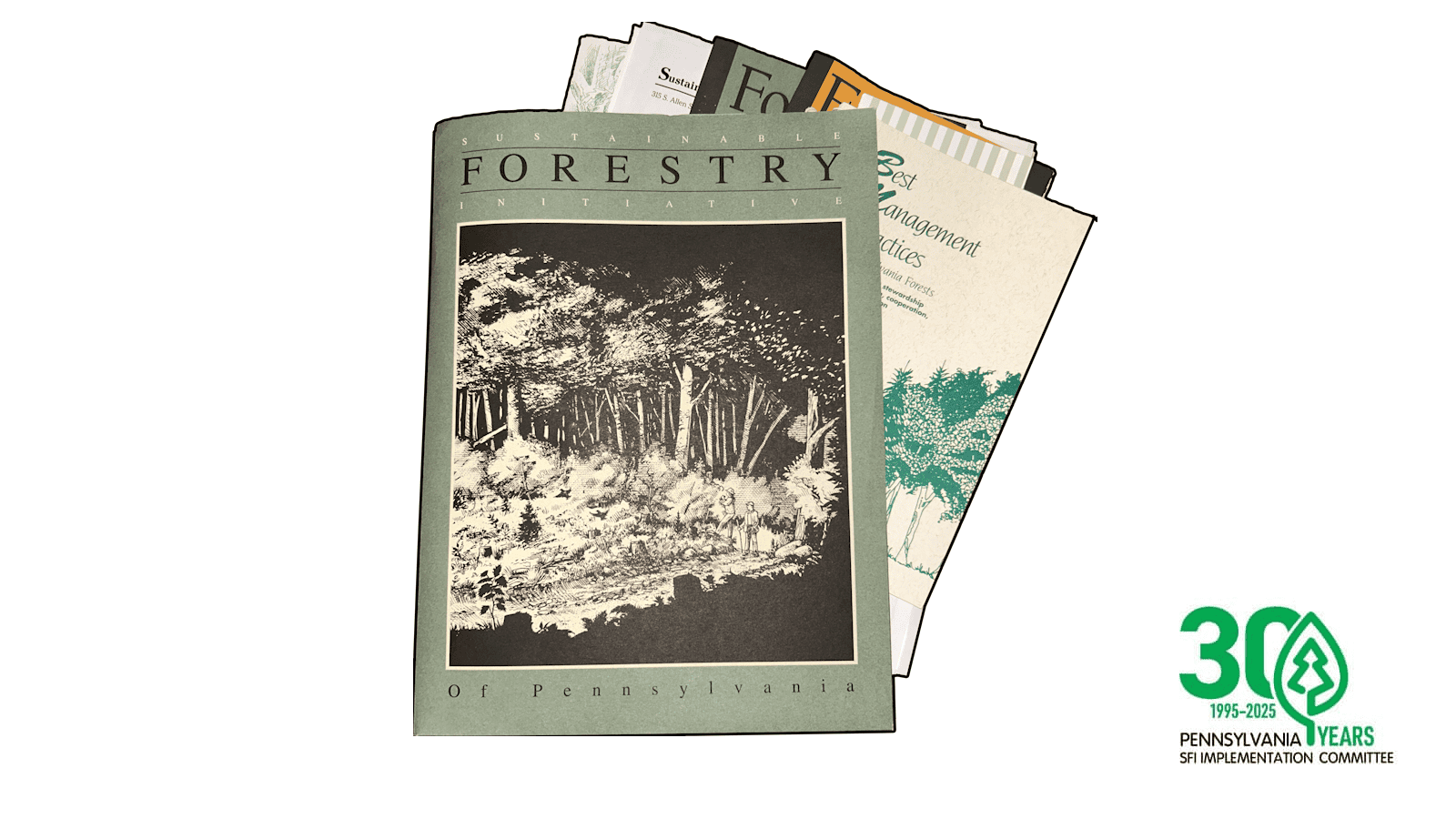
1997
Private Landowner Outreach
Industry leaders who developed the SFI Program recognized that public perception would not change if the program was only successful in improving management on the approximately 14% of timberland owned by AF&PA member companies. Additionally, the forest products industry in Pennsylvania depended on private landowner resources for an estimated 80% of its raw material. Ensuring the availability of the resource in the future was essential.
The SFI Guidelines therefore set out to foster the practice of sustainable forestry on all forestlands. Broadening the practice of sustainable forestry beyond the industry’s lands required that the SFI Program engage with non-industrial private landowners to ensure they have current information about the environmental impacts of forest management, and to encourage reforestation, the use of environmental Best Management Practices, and to improve the appearance of harvesting operations, particularly in highly visible areas.
The State Implementation Committees were the vehicles to conduct these important outreach and education efforts. In Pennsylvania, the Implementation Committee developed a packet of objective guidance on the use of BMPs, species retention, regeneration, residual stand protection and potential, and the impact of harvesting activities on future management options. “Forestry with Confidence” and the Timber Harvest Checklist (both available under the Resources section of this website) were two key publications developed by the Implementation Committee for the packets.
Industry members distributed these landowner packets during their interactions with private woodland owners. More than 26,000 SFI landowner packets were developed and distributed across Pennsylvania through the Implementation Committee.
As more people sought information online, these materials were updated, made more comprehensive, and made available through the Pennsylvania Implementation Committee’s website.
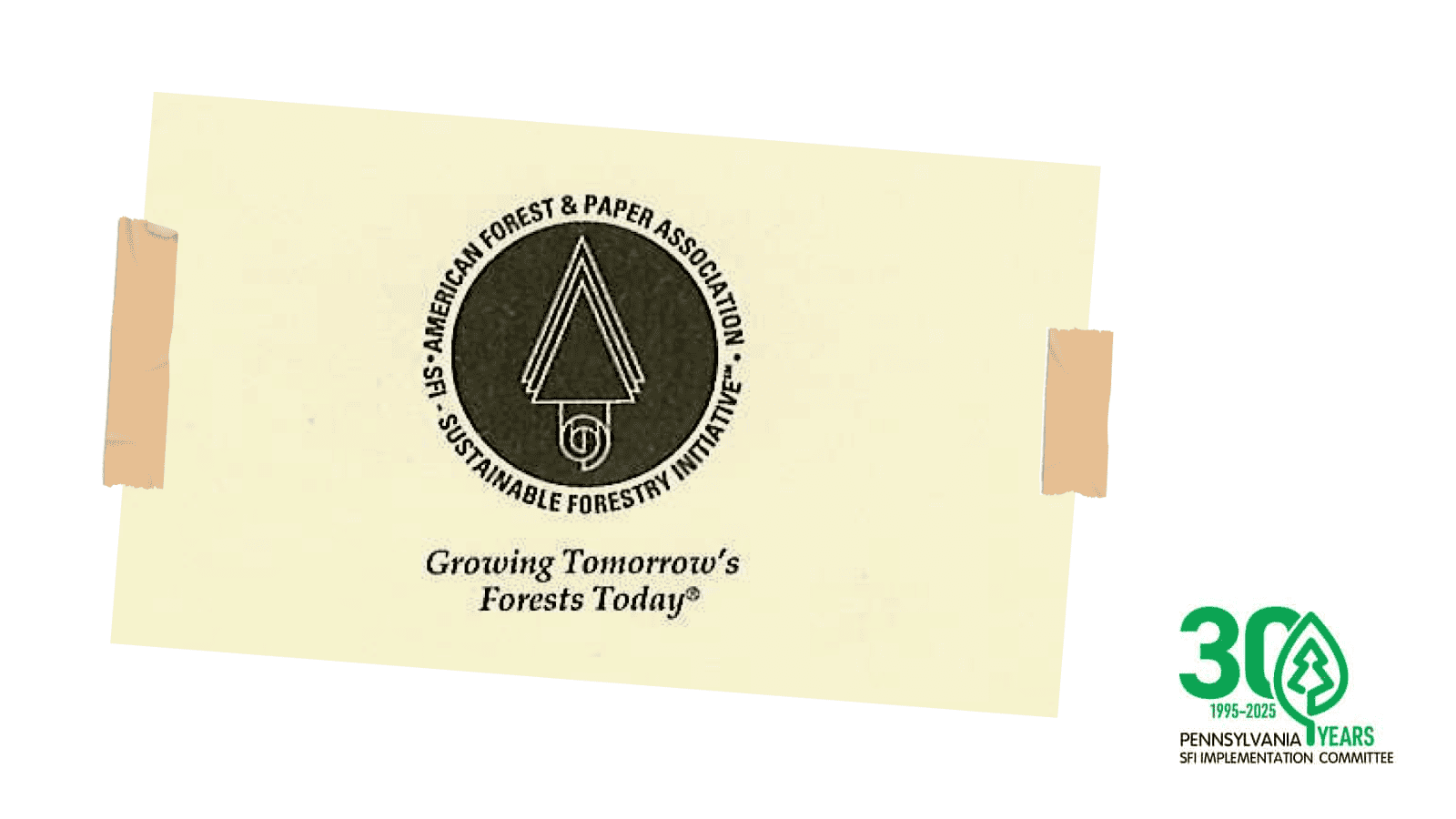
1998
SFI Licensee Program
Up to this point, the SFI Program was developed as an industry-led initiative – a code of conduct of sorts exclusively for AF&PA members. However, in 1998, AF&PA established a SFI Licensee program that allowed non-member companies to enroll their forestland and forestry operations in the SFI Program. By expanding the program to include outside groups, AF&PA looked to foster partnerships with diverse stakeholders to expand the number of forest acres in the U.S. that are managed wisely and in an environmentally friendly manner. Private and public organizations were invited to join as SFI Program Licensees, and were required to fulfill the same requirements as AF&PA member companies. The Conservation Fund was the first SFI Program Licensee, and St. Louis County in Northern Minnesota became the first public land agency to enroll their forestlands in the SFI Licensee program. The Pennsylvania DCNR Bureau of Forestry enrolled in the SFI Licensee Program in 2001.
By May of 2003, around 85 public and private organizations in the United States and Canada had committed to the SFI standard through the SFI Licensee program, bringing some 24 million additional acres under the SFI Standard. The Licensee program was discontinued in 2013 after SFI became fully independent from AF&PA and eligible participants were required to seek and acquire certification to the SFI Standards by the end of 2015.
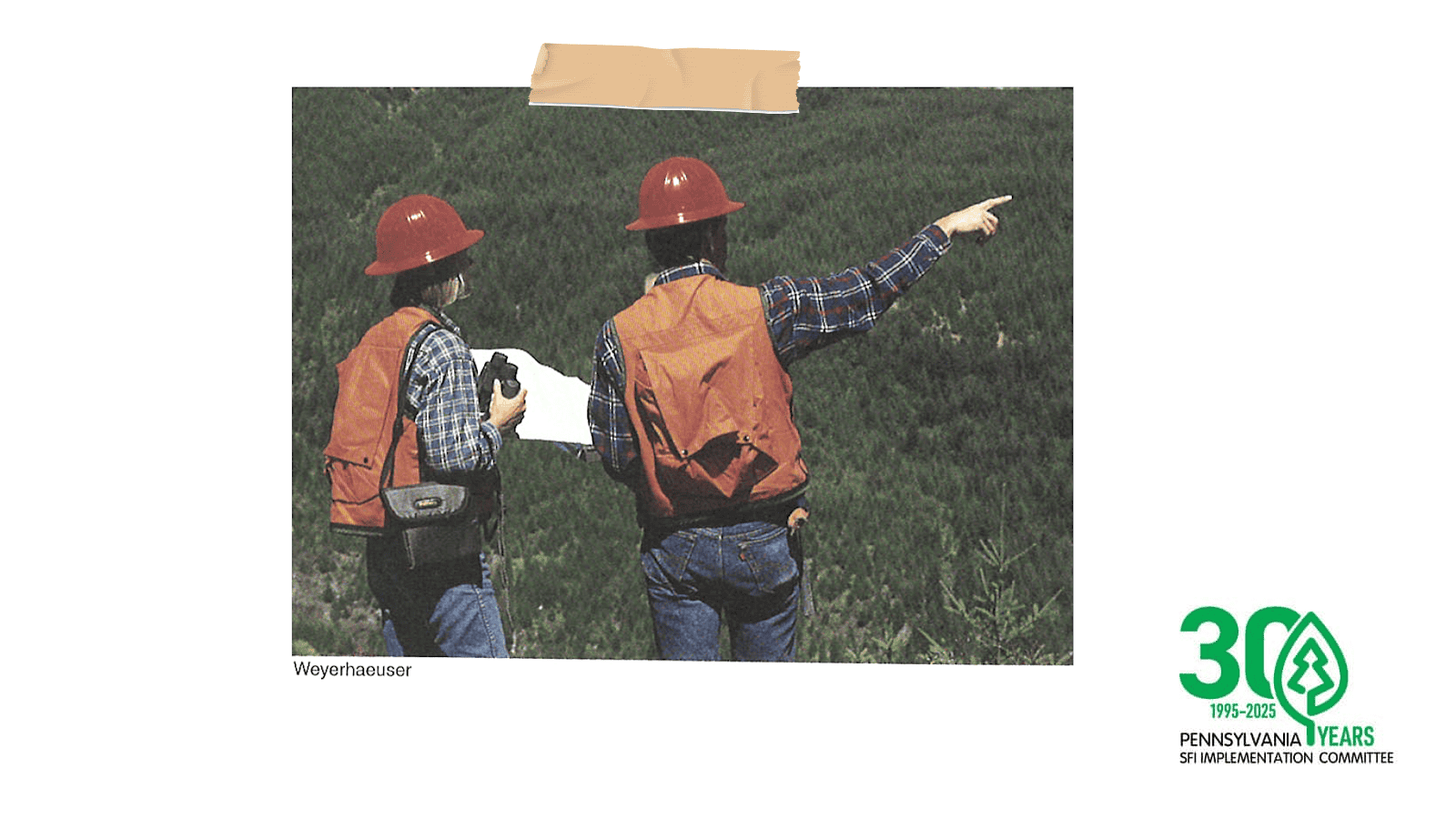
1999
SFI Voluntary Verification Process
At the outset of the SFI Program, verification of actual performance by SFI Participants was “first-party” through self-reporting of progress. In other words, it was based on the “good faith” assurances of the company itself that it was in fact managing in accordance with the SFI Principles. Furthermore, the individual reports member companies were required to submit to AF&PA each year were strictly confidential. This created challenges with the program’s credibility.
In early 1999, the SFI Principles and Implementation Guidelines were expanded into a formal industry standard consistent with other national and international standards, and SFI established a process for conducting voluntary verification to determine conformity with the SFI Standard. The SFI Voluntary Verification Process gave companies the option to continue auditing themselves (first party), have AF&PA, a customer, or another company do it (second party), or have an independent certifier audit their practices (third party). Only third-party verification constituted ‘certification’. Those who chose to voluntarily pursue certification had to follow a standard set of procedures and practices. Verifiers had to meet qualification criteria, companies had to achieve specific verification indicators, and reverificaiton was required within the first 3 years and every 5 years thereafter.
Voluntary certification was rapidly adopted, with some 700,000 acres going through third-party verification in the first year. By the end of 2002, over 96 million acres were certified. By 2004, the number of acres independently certified under the SFI program surpassed 100 million.

1999
The Forest Monitoring Project
The Expert Review Panel, AF&PA, the Izaak Walton League of America, The Conservation Fund, and the Rockefeller Brothers Fund cooperated to establish a Forest Monitoring Project (FMP). The FMP conducted over 50 randomly selected field reviews over a 3-year period, evaluating how effectively practices on the land supported the Annual Progress Reports.
On the basis of the FMP results, the Panel could assure the public that the progress reported was an accurate reflection of what was taking place in the participating forests. With all lands in the SFI Program eventually being required to undergo independent third-party certification, the FMP was discontinued and oversight of quality control in the field shifted to the independent auditors.

1999
Inconsistent Practices Reporting
At the recommendation of logger stakeholders, AF&PA established a biannual SFI National Forum in 1995. This stakeholder group consisted of senior industry representatives, AF&PA members, landowners, loggers, and the Expert Review Panel. The Forum ensured that loggers and landowners, in particular, could communicate with industry leaders on the development and implementation of the SFI Program and suggest improvements. Recommendations were reported to the AF&PA Forestry Committee and Board of Directors for their consideration. The Forum met annually from 1995 through 2002.
During the early years of the SFI Program, loggers raised concerns about the lack of an established procedure for reporting perceived violations of the new SFI Guidelines. The Expert Review Panel also challenged AF&PA in 1998 to develop a formal process at the national level to accept and address concerns related to the SFI program. When AF&PA failed to take action on this and other issues, the loggers withdrew from the 1999 summer National Forum meeting, presenting a formal letter of protest in an effort to force attention on their concerns.
As a consequence of the loggers’ protest, the SFI National Forum immediately established a joint Loggers Task Group. The task group members developed a new system through which professional loggers and others could report any perceived violations of the SFI Standard (i.e., “inconsistent practices) by AF&PA members. By the close of 1999, the SFI Executive Committee had approved the establishment of the Interim Inconsistent Practices Report Protocol. The new procedure allowed for the filing of anonymous complaints of possible SFI program infractions, which were then investigated and reviewed by a representative of the SFI Expert Review Panel, who then made a recommendation for action.
Complaints regarding forestry practices and the SFI program were also dealt with through the Implementation Committees. In 1999, several of the State Implementation Committees either had or were working on developing protocols for receiving and addressing inconsistent practice complaints. Eventually, all Implementation Committees were required to have a defined Inconsistent Practices program. The Pennsylvania Implementation Committee formally adopted its Inconsistent Practices Reporting Guidelines and Procedures on April 13, 2000. Click here for more information.
In April of 2002, the Sustainable Forestry Board (SFB) established the Certification Appeals Subcommittee (CAS) to handle questions about validity of a SFI certification. The subcommittee was Chaired by former National Outstanding Tree Farmer, Tom Thomson of New Hampshire. If the CAS determined a claim had merit it was referred to an Ad-hoc Certification Review Task Force with the power to suspend the certification.
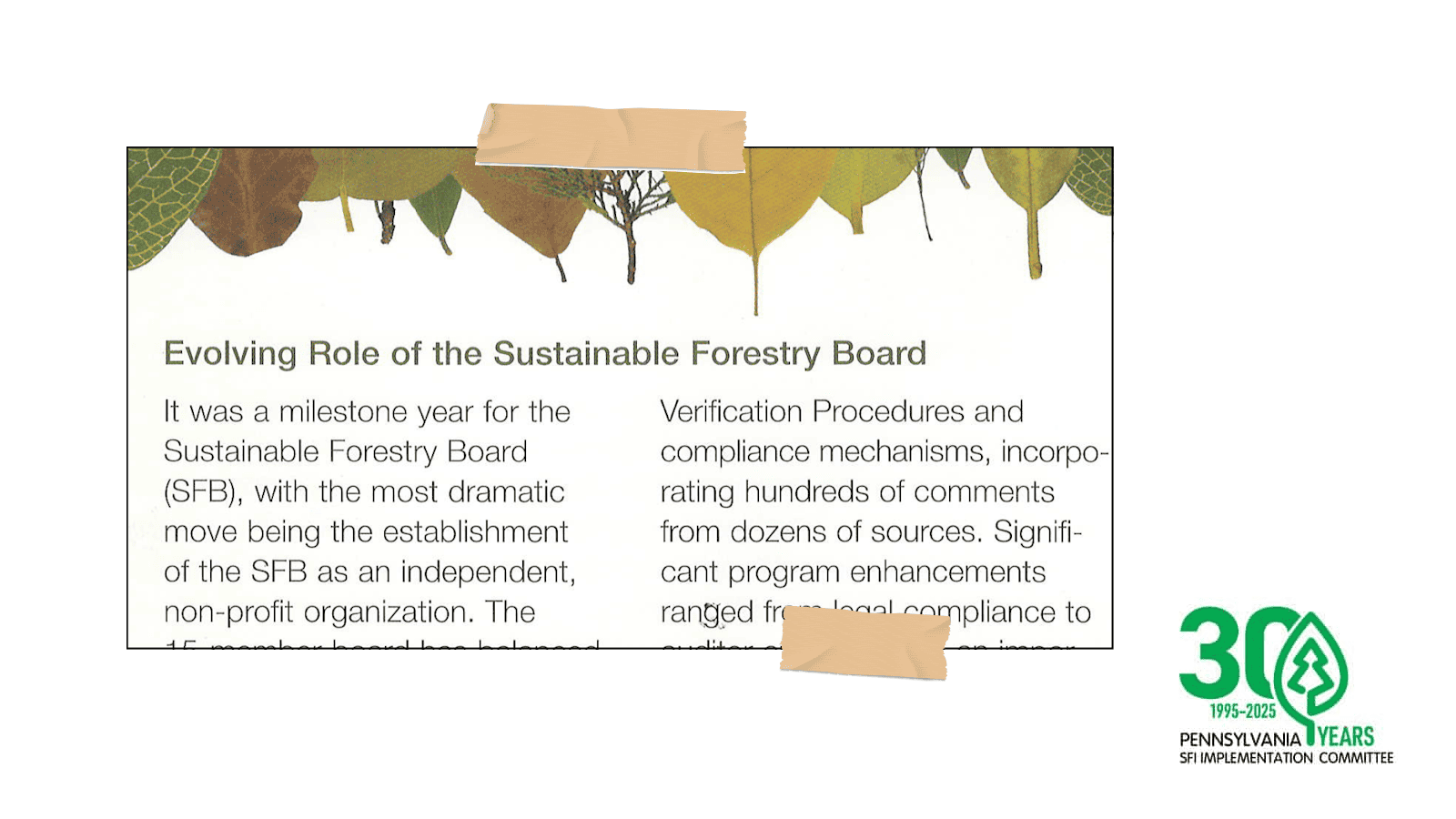
2000
The Sustainable Forestry Board
The SFI program was initially designed and operated within the AF&PA organization, but internal management by a national trade association limited the program’s credibility. As a result, AF&PA took a bold step forward in July 2000 by chartering a 15-member multi-stakeholder Sustainable Forestry Board (SFB) and imparting it with full responsibility of managing the SFI Standard (subject to AF&PA’s endorsement), SFI Verification Procedures, and SFI program compliance. This new body was composed of 40% SFI Program Participants and 60% other forestry interests. In other words, outside stakeholders comprised a majority of the SFB.
To enhance the autonomy of the SFI Program, the SFB filed Articles of Incorporation on January 22, 2002 to become an entity separate from AF&PA, and received a 501(c)(3) nonprofit status. This ensured that governance of the SFI Program was largely conducted by an independent organization. The new Sustainable Forestry Board, Inc. also rebalanced so that one-third of the Board members consisted of conservation and environmental organization representatives, one-third represented SFI Program Participants appointed by AF&PA, and the remaining one-third was drawn from the broader forestry community such as forestry research institutes, unions and trade associations. Directors served staggered three-year terms and could serve no more than two consecutive full terms. For any action to be passed by the SFB, a minimum of 80% of the directors present, which had to include at least two representatives from each membership sector, needed to vote in support of the action.
The SFB selected its own Executive Director. Carlton Owen, founder of The Environmental Edge, LLC, an environmental consultancy and former Vice President of Forest Policy at Champion International Corporation, was hired as SFB’s Interim Executive Director in February of 2001. William H. (Bill) Banzhaf was announced as the new President and CEO of the SFB in January 2003.
The SFB was chaired by CEOs from the forest products industry until April 28, 2005, when Lawrence Selzer, President and CEO of the Conservation Fund, was elected Chair. The election of a Chair from the environmental community for the first time was a sign of continued maturation of the SFB.
Prior to 2007, AF&PA and the SFB had a “sister” relationship, but with distinct responsibilities. AF&PA still guided the Implementation Committees, got involved with policy issues that affected certification in the marketplace, and, starting in 2002, they ran the Office of Licensing and Label Use.
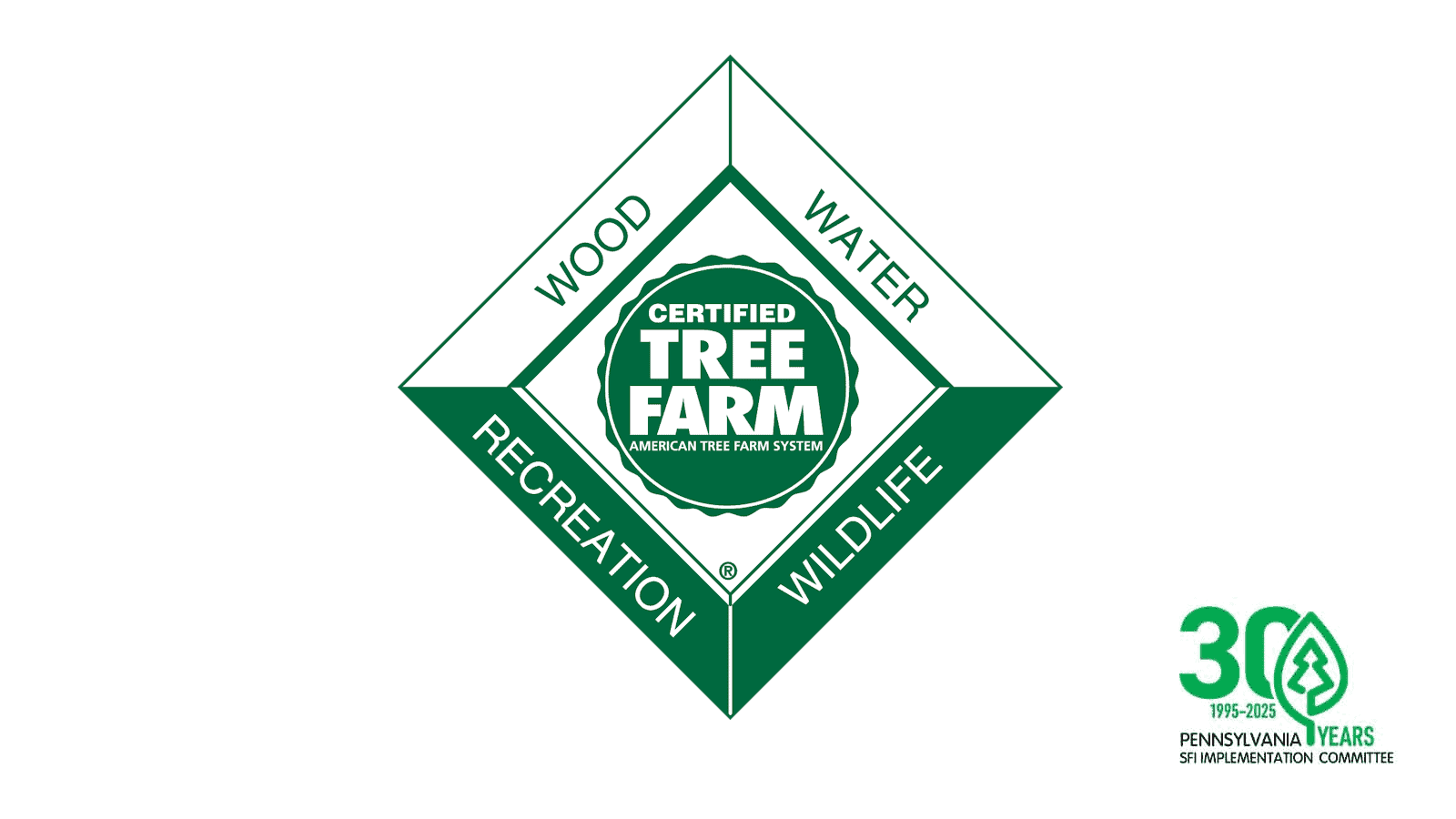
2000
Mutual Recognition with Tree Farm Program
In 1998, the American Forest Foundation’s (AFF) American Tree Farm System® was formally recognized through resolution by the American Forest & Paper Association’s (AF&PA) SFI Program as a powerful tool for advancing the practice of sustainable forestry on private lands.
In June 2000, AF&PA signed a mutual recognition agreement with AFF to collaboratively promote sustainable forestry on non-industrial private lands. This agreement recognized SFI as a credible standard for industry, larger ownerships, and licensees, and Tree Farm program as a credible standard for non-industrial landowners. It also maintained the independence of both programs. It had a goal of making Tree Farm consistent with the SFI Standard so that it could serve as the size-appropriate functional equivalent of SFI for small forest ownerships. It also provided SFI with a means to provide additional outreach to family forest owners, a key audience for “fostering the practice of sustainable forestry on all forestlands.”
In 2002, the Pennsylvania SFI Implementation Committee established a MOU with the Pennsylvania Tree Farm Committee, the first agreement of its kind between SFI and the Tree Farm Program at the state level.

2000
SFI Expands to Canada
The SFI Program expanded into Canada and established an Implementation Committee in British Columbia. “State Implementation Committees” were renamed “SFI Implementation Committees” in recognition of the newly included Province.

2000
Pennsylvania DEP Expresses Support for SFI
In a final rulemaking for updating Chapter 102 of the Pennsylvania Code, which addresses earth disturbing activities and Best Management Practices, the Pennsylvania Department of Environmental Protection (DEP) stated “DEP has been working with several groups of stakeholder in addressing the use of BMPs for timber harvesting and road maintenance activities. The Department supports the non-regulatory approaches of the Sustainable Forestry Initiative…in promoting, educating and training persons conducting these activities to use BMP techniques and standards to minimize accelerated erosion and thereby enhance the quality of this Commonwealth’s waters.”
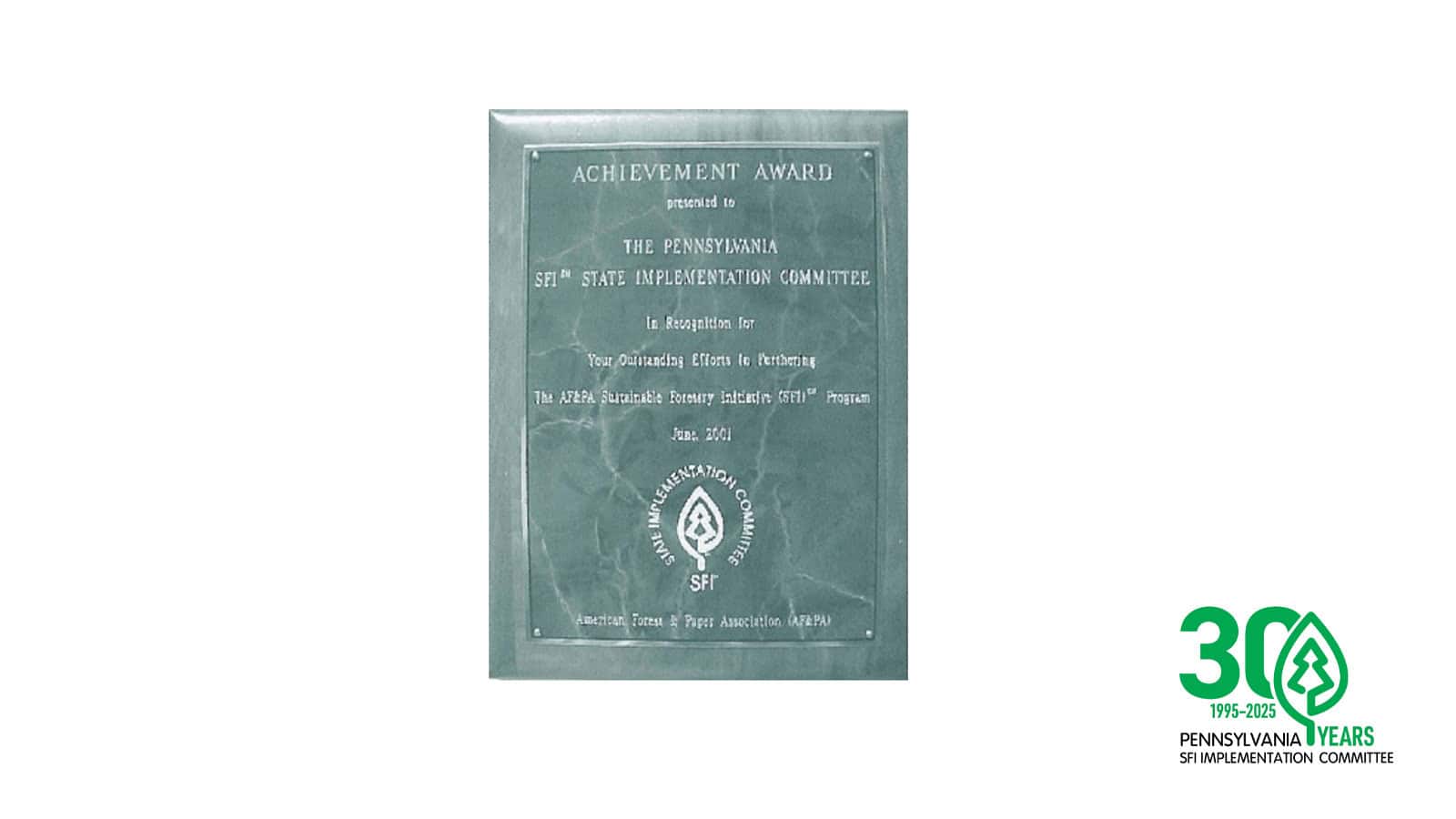
2001
Pennsylvania Receives 3rd Annual Achievement Award
The Pennsylvania SFI Implementation Committee was recognized for its outstanding work in implementing the SFI Program and awarded the 3rd Annual SFI Implementation Committee Achievement Award by AF&PA.
Pennsylvania received the annual award for its significant strides in outreach efforts with policymakers and the forestry community; for implementation of a comprehensive communications program; for greatly expanding the number of affiliations of companies/organizations directly involved in the program; and for fostering new partnerships.
The Minnesota Implementation Committee was the first to receive the award in 1999, followed by the Maine Implementation Committee in 2000.
Award recipients are selected by the SFI External Review Panel.
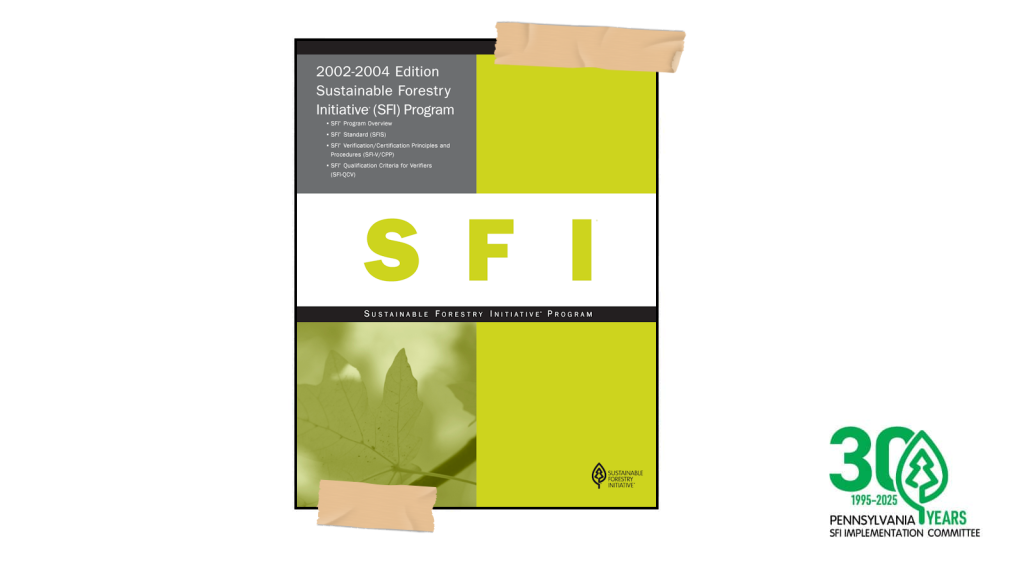
2002
SFI Launches 2002-2004 Standard
One of the first official actions of the Sustainable Forestry Board (SFB) was the initiation of a public review of the SFI Standard which resulted in the adoption of the enhanced 2002-2004 Standard in December of 2001. “These program enhancements are the result of the most comprehensive and thorough review of the SFI Standard since the programs’ launch in 1994,” SFB Chairman, Rick Holley, said at the time.
The new Standard introduced, among other things, explicit measures to improve outreach to family forest owners and for the protection of “Forests with Exceptional Conservation Value”. It also contained provisions to help prevent illegal logging and to promote the conservation of biodiversity hotspots and major wilderness areas. The new standard required SFI Participants to develop plans for the location and protection of known sites with viable occurrences of species and communities identified as critically imperiled or imperiled, working with NatureServe or another organization with similar expertise.
At this point, the Standard Review Process was set on three-year cycles to ensure a commitment to continual improvement.
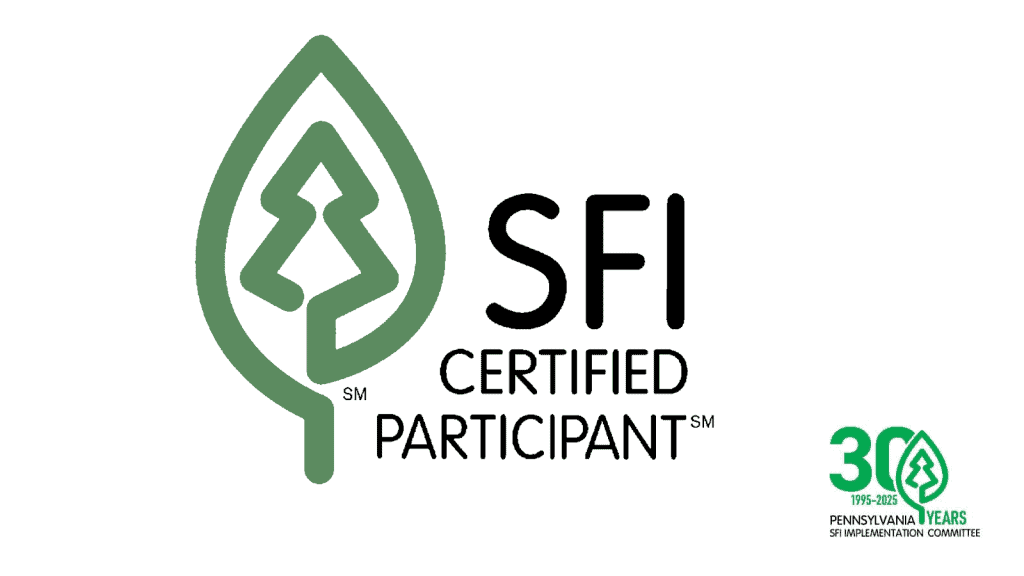
2002
AF&PA Launches On-Product Labeling
In June, AF&PA launched the first SFI on-product labeling program. Four on-product labels were designed and made available to Program Participants, with different labels used for those mills that received most of their raw material directly from the forest (“Primary Producers”) and those that ran largely processed wood (“Secondary Producers”). SFI Program Participants who successfully completed third-party certification to the enhanced 2002-2004 SFI Standard and met strict on-product label requirements began using the on-product labels that year. Periodic (annual) surveillance audits were required for all SFI Certifications where a Program Participant wished to use an SFI on-product label.
AF&PA managed the newly created Office of Licensing and Label Use until 2007, when SFI Inc. took over.
Today, the SFI on-product labeling program continues to provide SFI Certified Organizations the opportunity to give customers and consumers in the marketplace a visible stamp of assurance that they are purchasing products from organizations committed to sustainable forestry and in full compliance with the SFI Standard.
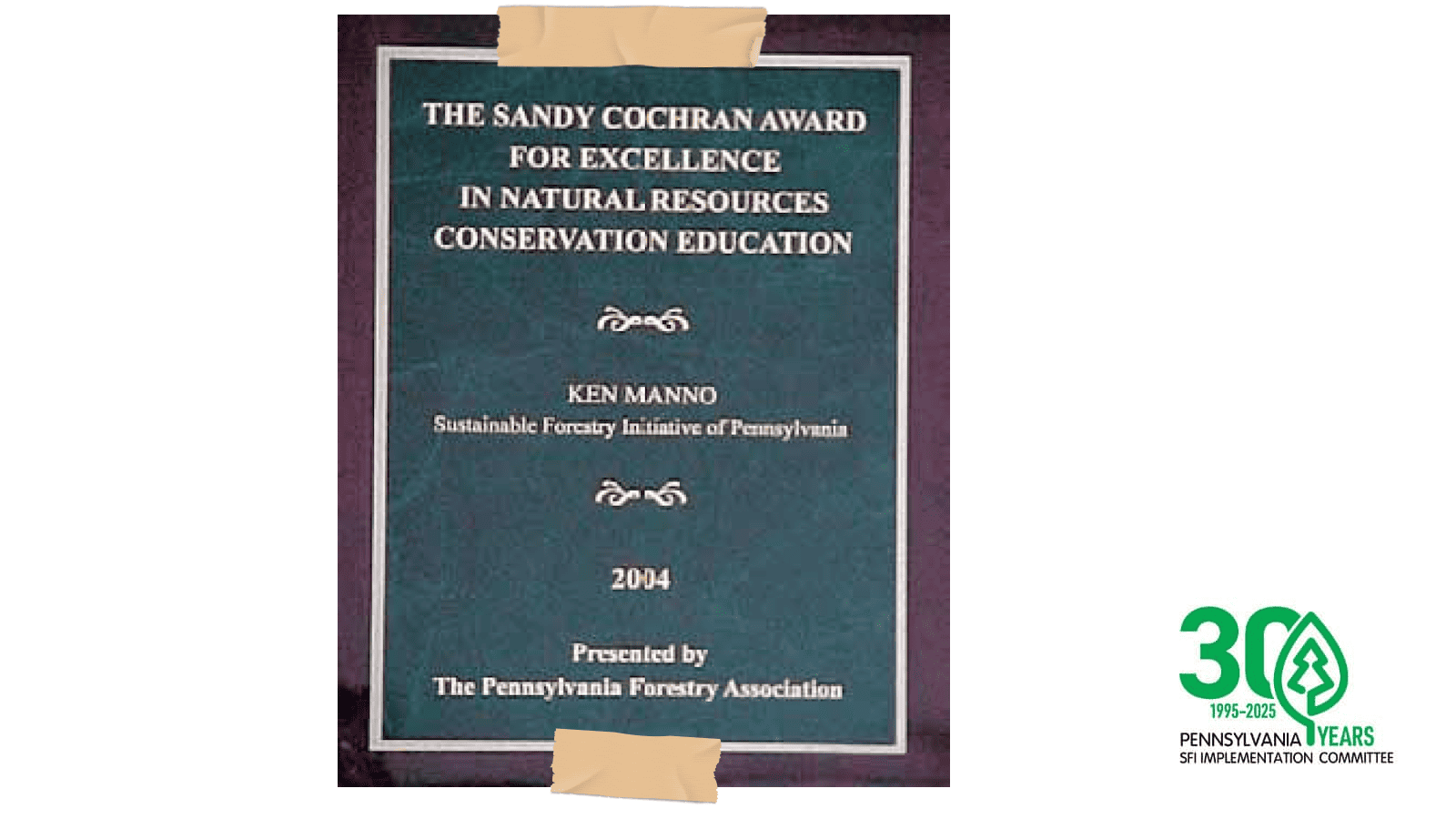
2004
Ken Manno Recognized with Sandy Cochran Award
The Pennsylvania Forestry Association recognized Ken Manno and the Pennsylvania SFI Implementation Committee at their September 10th annual awards dinner with the Sandy Cochran Award for Excellence in Natural Resources Conservation Education.
This award honors individuals or programs designing, developing, and implementing educational programs focused on the conservation and management of Pennsylvania’s natural resources. It was established in memory of Roe S. “Sandy” Cochran (1925-1991), a beloved past director of the Pennsylvania Forestry Association and a Penn State forest resources extension agent for 25 years.
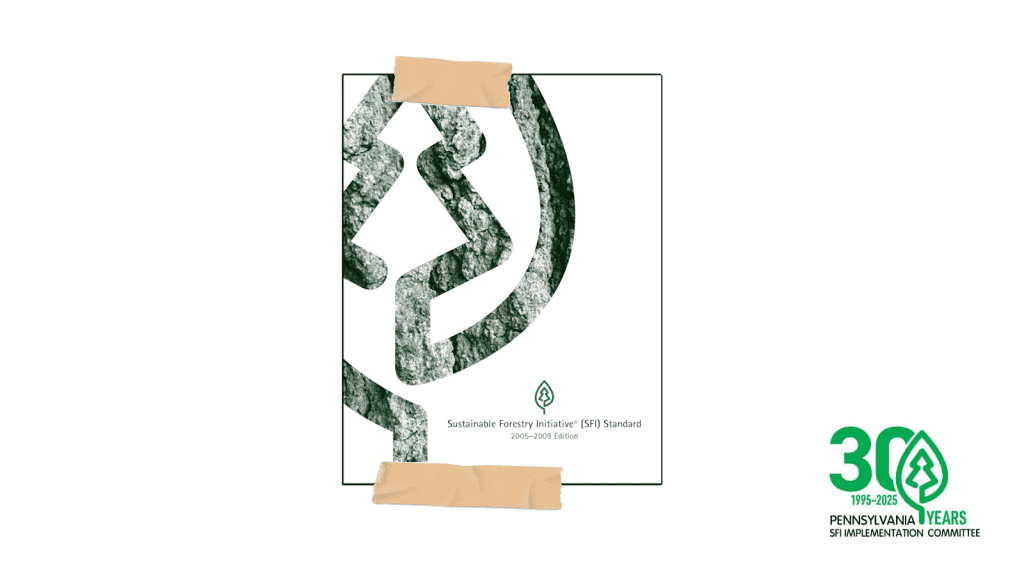
2005
SFI Launches 2005-2009 Standard
The Sustainable Forestry Board (SFB) initiated a second review of the SFI Standard in December 2003 which resulted in a new 2005-2009 Standard published in late 2004. The Standard went into effect on January 10, 2005. It included new provisions to conserve old-growth forests; to strengthen fiber sourcing from jurisdictions outside of North America and supply chain monitoring; and to address invasive exotic species. It introduced new performance measures and indicators related to the certification of public forestlands, including requirements to confer with affected indigenous peoples.
The External Review Panel stated that “The 2005-2009 SFI Standard is a sustainable forestry standard that can be fairly compared against any in the world.“
In order to ensure the relevance of the program to current forest conditions, and continue to fulfill its commitment to continuous improvement, the SFI Standard was moved to a 5-year revision cycle.

2005
SFI Program Celebrates 10 Years
Originally designed as a code of conduct for the forest products industry in the United States, the SFI program had grown over 10 years to become one of the largest sustainable forestry and certification programs in the world. In its 2003 annual report, the SFB described its program as “a comprehensive system of principles, objectives and performance measures developed by professional foresters, conservationists and scientists, which combines the perpetual growing and harvesting of trees with the long-term protection of wildlife, plants, soil and water quality.”
By this time, more than 129 million acres in North America had been independently, third party certified to the SFI Standard, making it North America’s largest forest certification program. Factoring in Program Participants’ procurement systems and the vital activities of the SFI Implementation Committees, including forest landowner outreach and logger and forester training, the SFI program was now positively affecting the practice of forestry on nearly half a billion acres of North American forestland.
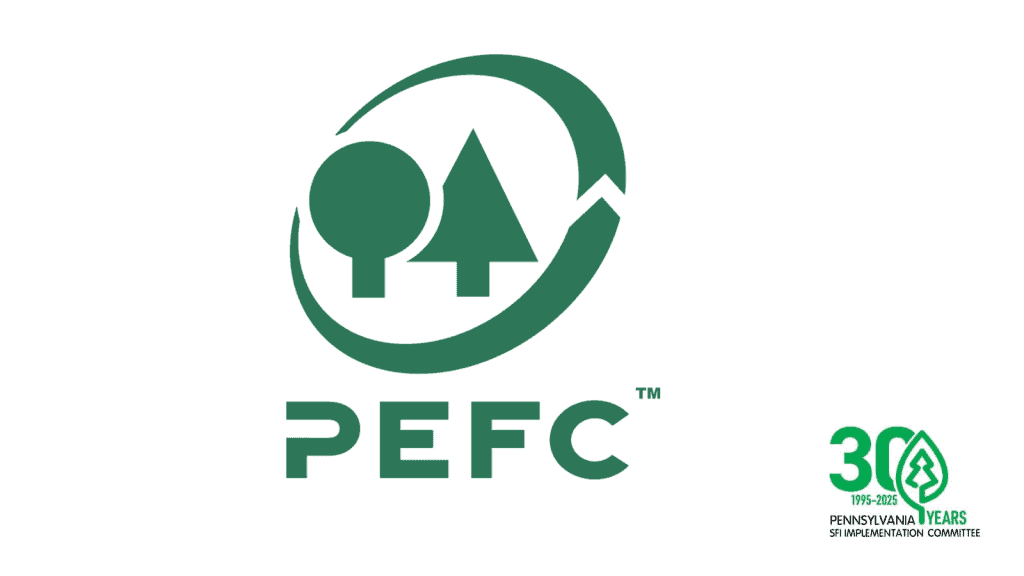
2005
Endorsement by PEFC
As the forest certification movement continued to grow worldwide, the SFI Program increased its focus on the global stage. While the SFI Program only enrolls forestland in the U.S. and Canada, manufactured forest products are traded globally. Across the globe, customers were increasing their demand for knowing that wood products were harvested legally through certification of forests and forest products.
On December 7th 2005, the SFI program received full endorsement by the Programme for the Endorsement of Forest Certification schemes (PEFC). This endorsement included an independent review of the SFI program and standards in relation to the PEFC’s international requirements for credible forest certification schemes. With the endorsement of the SFI Standard, the Sustainable Forestry Board (SFB) was appointed the PEFC-US Governing Body in March of 2006. PEFC endorsement brought greater recognition to SFI internationally and provided global market acceptance for SFI certified products.
In June of 2006, SFI and PEFC entered an agreement allowing all certified SFI Program Participants with forest management operations to license to use the PEFC forest management logo with no additional audits. Program Participants could also license to use PEFC on-product labeling by completing an audit to the PEFC Chain of Custody standard with no PEFC label licensing fees.
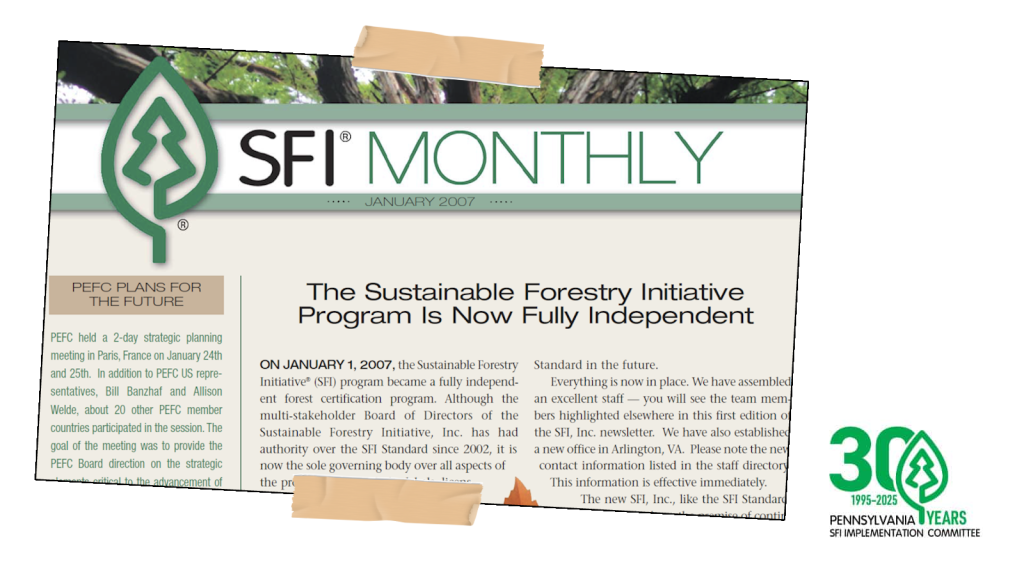
2007
SFI Becomes Fully Independent Organization
In July of 2006, a plan to provide complete independence of the SFI program from AF&PA was jointly approved by the boards of both organizations. The Sustainable Forestry Board (SFB) agreed to assume full and independent administration of all aspects of the SFI program by January 1, 2007.
Under the plan, a new entity, the Sustainable Forestry Initiative Inc., was created to govern all aspects of the SFI program, including chain of custody, labeling, communications and promotion. Still today, SFI Inc. is governed by a 18-member, three-chambered SFI Board of Directors. Governance of SFI is structured purposefully to ensure equal voting power to environmental, social, and economic interests.
On July 23, 2007, SFI Inc. announced that Kathy Abusow would be its new President and CEO.
Former State Forester and Director of the Pennsylvania Bureau of Forestry, Ellen Shultzabarger, was elected to serve on the SFI Board’s Social Sector from 2021 to 2023.
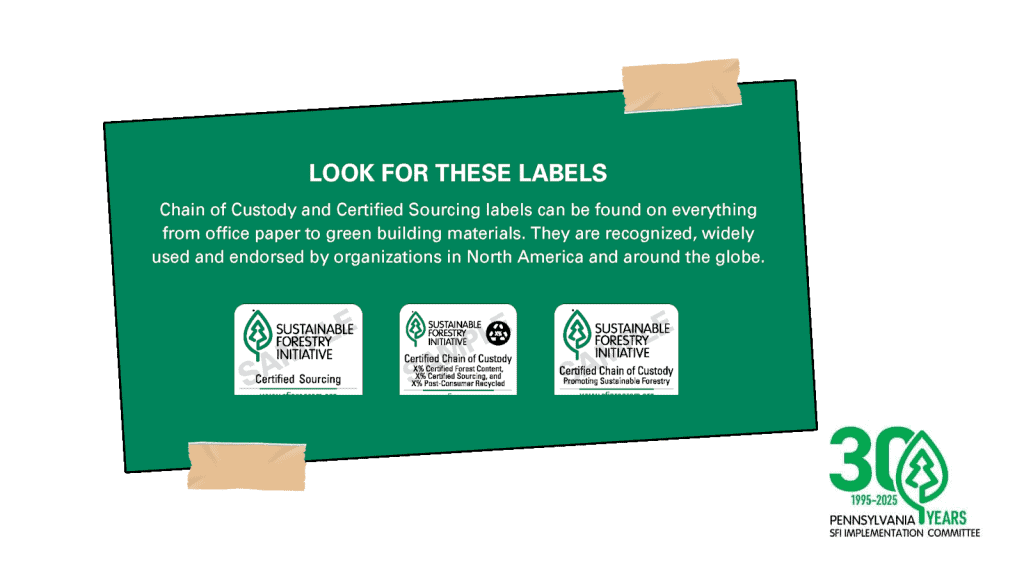
2008
SFI Inc. Launched New On-Product labels
As the marketplace began to fill with “green” claims on a wide range of products, SFI announced in September 2008 the launch of new on-product labels designed to provide more detailed information to businesses and consumers. SFI Participants would begin implementation of the labels immediately, and fully transition to the new labels by the end of 2009.
SFI Inc.’s three new and distinct labels replaced the 10 labels previously available to participants and clearly articulated specific claims and information such as the type of third-party SFI certification the product is compliant to, SFI’s website address, the amount of wood fiber in a product that came from certified forests, and how much recycled content is in the product. This marked the third time the SFI Program had updated its labels to ensure they were easy to understand and convey essential information.
Enhancements were again made to the SFI on-product labels in 2011. These changes strengthened the link between the claim on the labels and definitions in the SFI Standards. A unique label identification number was also added to facilitate the tracking of label users.

2009
Pennsylvania's Second Program Manager
Nate Fice was hired as the second Program Manager for the Pennsylvania SFI Implementation Committee. In the midst of The Great Recession, Nate quickly streamlined the program’s administrative operations to match the Committee’s declining financial environment and reduced staff capacity, while maintaining the integrity and high level of service delivered by the program. Nate’s tremendous efforts modernized the program and incorporated the use of technology. He also increased emphasis on safety and professionalism in the PA SFI Professional Timber Harvester Training program by integrating Game of Logging training into the core requirements.

2010
SFI Launches 2010-2014 Standard
SFI Inc. launched the new SFI 2010-2014 Standard, the result of an extensive 18-month transparent review process that considered public input, scientific and economic factors, and conflicting demands. The SFI 2010-2014 Standard was based on 14 core principles that promote sustainable forest management, including measures to protect water quality, biodiversity, wildlife habitat, species at risk, and Forests with Exceptional Conservation Value. It had five more principles than the SFI 2005-2009 Standard, including separate principles for protection of special sites, biodiversity, aesthetics and recreation, and new principles for responsible procurement practices in North America, avoidance of controversial sources offshore, research, training and education, and public involvement.
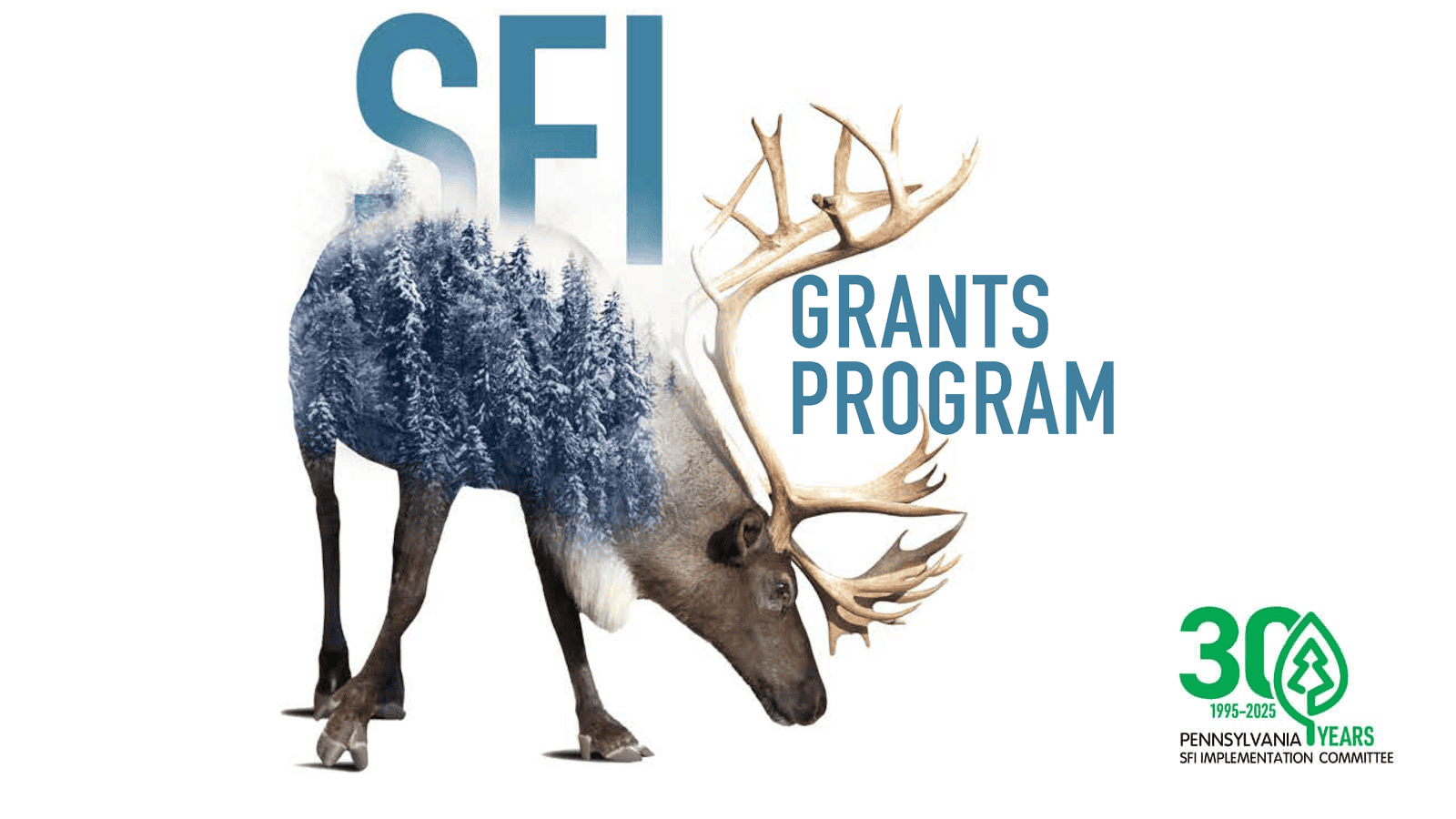
2010
SFI Launches Conservation & Community Partnership Grant Program
SFI is the only forest certification program in North America that requires participants to provide in-kind support or funding for forest research to improve forest health, productivity, and sustainable management of forest resources, and the environmental benefits and performance of forest products. This requirement dates back to the original SFI Guidelines. Today, more than $2 billion has been directly invested in forest research by SFI-Certified Organizations since 1995.
In May 2010, SFI Inc. announced a new Conservation and Community Partnership Grant program that furthered this long-standing commitment to research.
SFI Conservation Grants are designed to foster relationships between organizations interested in improving forest management in the United States and Canada, and responsible procurement globally. SFI committed $675,000 in 2010 to fund nine North American conservation projects dedicated to—among other things—improving forest habitat and biodiversity, and reducing illegal logging globally.
SFI’s Community Grants support the SFI Program’s Vision of “a world that values and benefits from sustainably managed forests”. They are awarded for collaborative community-based projects, activities, or events that support SFI’s efforts to connect local communities to sustainably managed forests, and expand the understanding of their value and benefits.
Since 2010, SFI has awarded more than 115 Community grants totaling more than $1 million to foster community-building projects, and more than 70 Conservation grants totaling nearly $5 million (or more than $13 million when including leveraged project partner contributions) to quantify and demonstrate the value of SFI-certified forestlands, and lands providing fiber through the SFI Fiber Sourcing Standard, towards mitigating climate change impacts, enhancing biodiversity, and protecting water resources.

2012
Pennsylvania's Third Program Manager
Chuck Coup became the third Program Manager for the Pennsylvania SFI Implementation Committee. Chuck continued to streamline and standardize administrative processes, expand the use of electronic communications, grew the PA SIC’s network of collaborators, and improved program accessibility and reach by developing and maintaining a user-friendly website filled with valuable content, the capacity to handle online registrations for the logger training program, and a searchable database for training participant records. In many ways, the expanded website took on the capacity of an additional staff member at a critical time. Chuck digitized almost all of the PA SICs massive archive of paper records from the previous 20 years. He wrote numerous technical guidance documents and contributed to the publication of many others, maintained a PA SIC directory, and wrote articles for the PA SIC’s newsletters and several other outlets. He overhauled the Professional Timber Harvesting Essentials training course, and during the COVID-19 pandemic he was instrumental in ushering the PA SIC’s logger training program into the era of virtual learning.
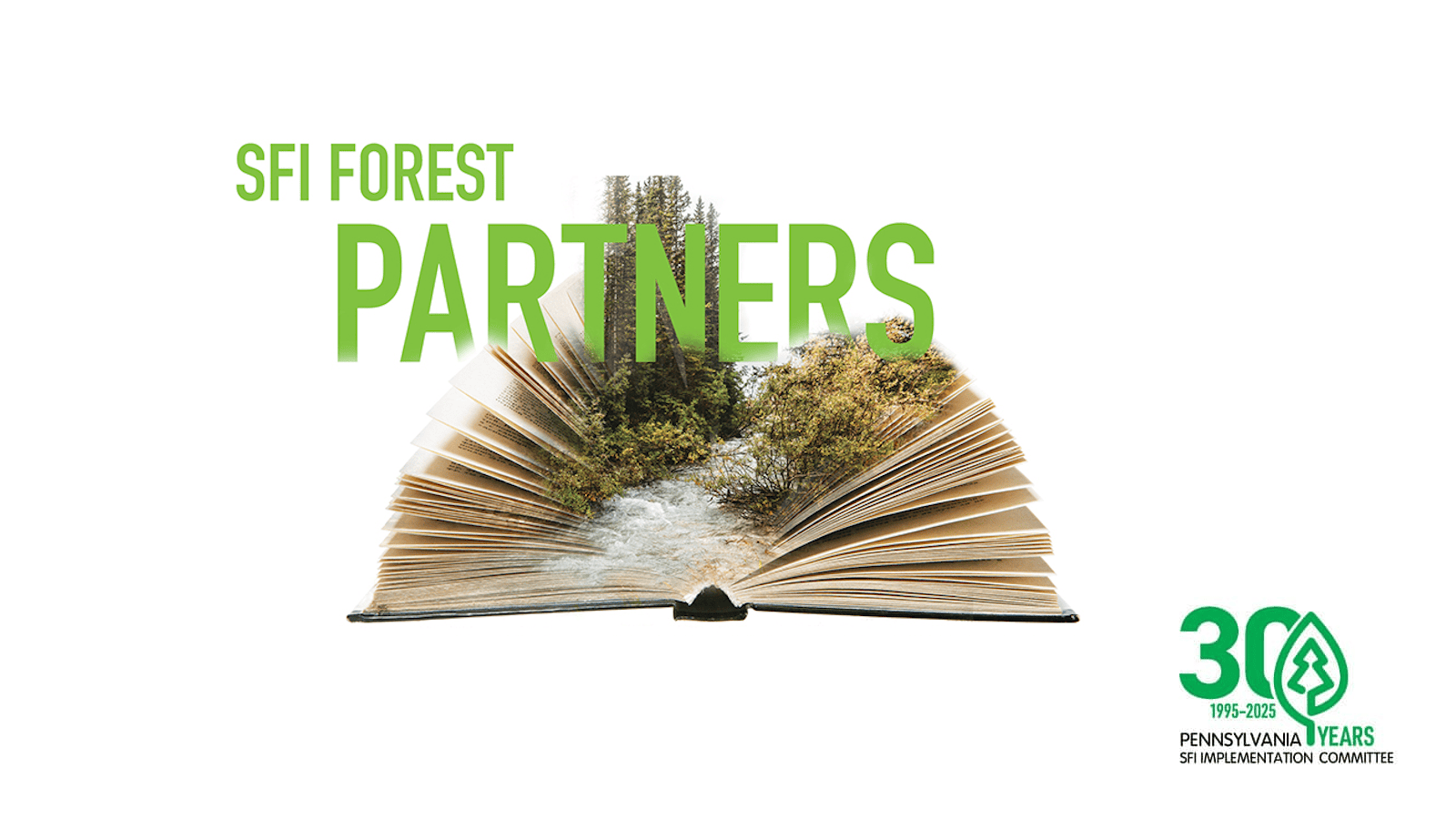
2012
SFI Launches Forest Partners® Program
In 2012, four market leaders — Time Inc., the National Geographic Society, Macmillan Publishers, and Pearson — stepped forward and became founding SFI Forest Partners®, investing in the future of forests by making a five-year commitment to increase the source of certified forest products. The program worked to involve more landowners, manufacturers, distributors, customers, conservation groups and government agencies across the supply-chain and had a goal of certifying 5 million additional acres of forests to the SFI standard by 2014, and 5 million more acres by 2017, starting in the U.S. South. The Partners worked collectively with the SFI community to make certification more efficient and accessible, particularly for small and medium sized mills and forest ownerships, by providing resources for activities such as shared consulting expertise, group certification, or audit coordination. The program was extended to grow the certified forestland base by another 5 million acres in the U.S. and Canada by the end of 2020.
The SFI Forest Partners Program was built on an innovative pilot project in Maine that resulted in an additional 1.4 million acres certified to the SFI Standard, and an additional 100,000 acres certified to the American Tree Farm Standard.
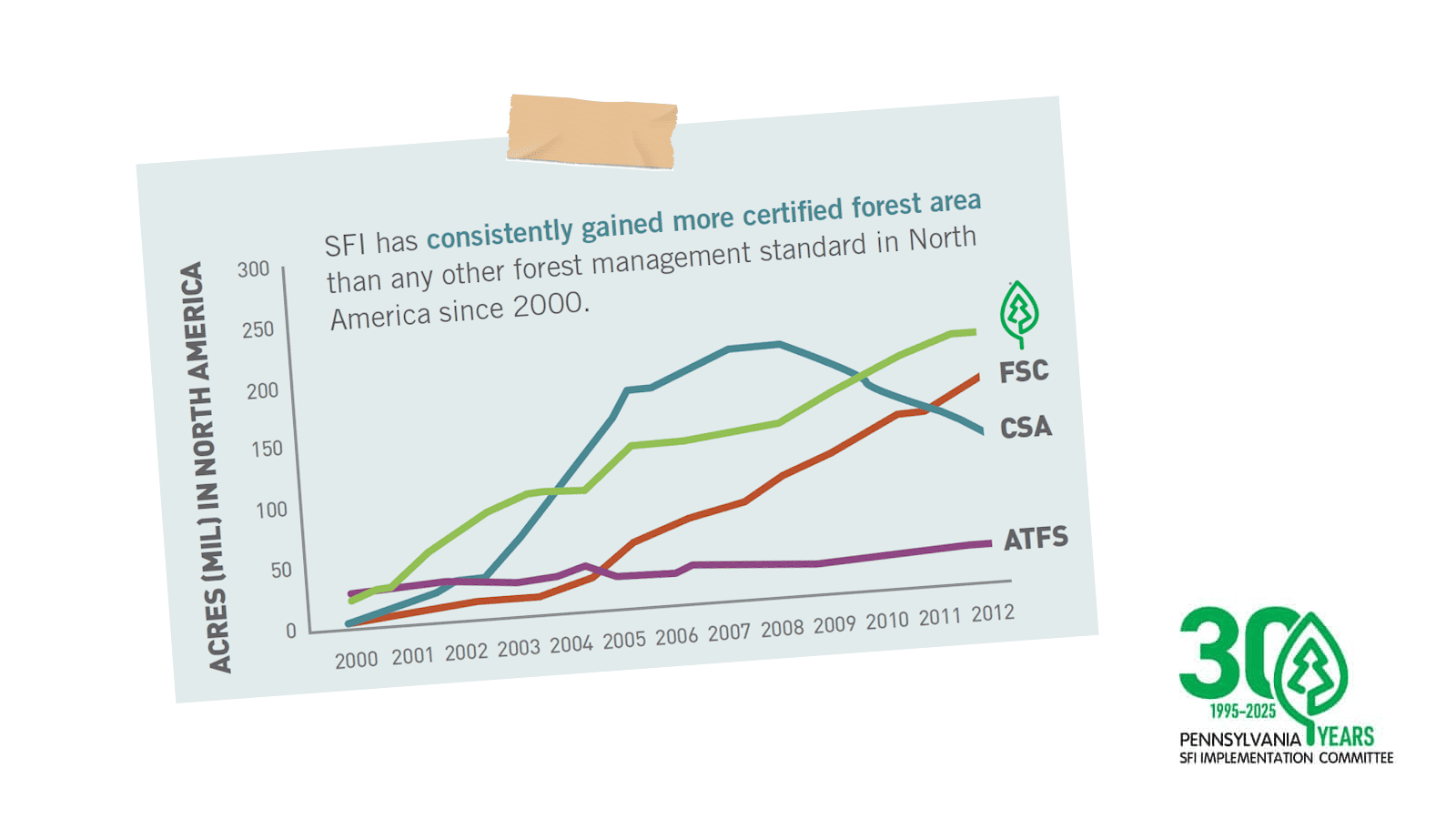
2012
SFI Certified Forestlands Reach 200 Million Acres
SFI certified forests reached 200 million acres in North America in 2012. At that time, this made it the largest single standard in the world. Tens of millions more acres were being positively influenced by the SFI Fiber Sourcing Standard. “With 200 million acres now certified to the SFI forest management standard, which is roughly the size of California and Newfoundland/Labrador combined, we know we are influencing responsible forestry on a significant scale,” SFI Inc. president and CEO Kathy Abusow stated in a press release.

2013
Pennsylvania Implementation Committee Website Upgrades
In 2013 The Pennsylvania SFI Implementation Committee added online registrations to its website, allowing logger training participants the convenience of reviewing and registering for courses and instantly accessing the most current information for each training course (www.sfiofpa.org/register). Gone were the days of hunting down the paper copy of our training schedule and registration form and hoping that the mail would deliver it to the Implementation Committee’s office before the deadline.
In early 2015 The Implementation Committee took another step forward by launching a new online database that provided the Pennsylvania SFI Professional Timber Harvester Training Program participants with 24-hour access to their complete training records (www.sfiofpa.org/search). This new online database replaced the cardholder lists that had been published on the website for many years. Those lists only identified the participants that held a current Qualified Logging Professional Status with the Pennsylvania Implementation Committee, and those that had let theirs expire in the last 5 years. The new database gave training participants access to the information they needed to help keep their training current. It also allowed SFI Program Participants, foresters, and landowners to more easily check the status of their timber harvesters/suppliers, what training that had received, and when they completed it.
In 2024, the Pennsylvania SFI Implementation Committee’s dated website received a much-needed overhaul. The previous website had been developed in 2009, just before tablets and smart phones came into widespread use.
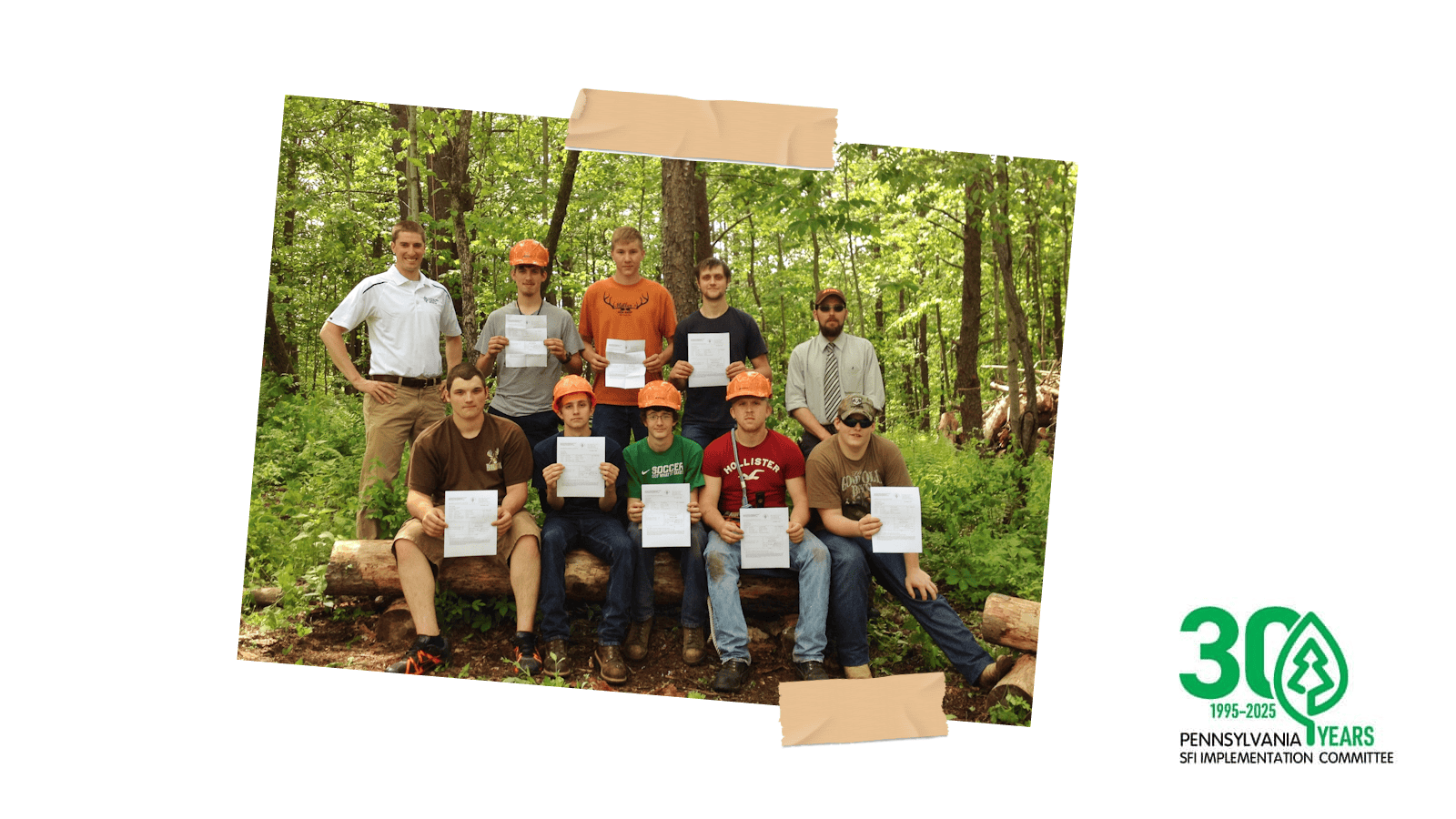
2014
Pennsylvania Implementation Committee Brings SFI Logger Training to Students
A new and innovative partnership between the Pennsylvania SFI Implementation Committee and the Keystone Central School District Career & Technology Center at Central Mountain High School in Mill Hall, PA allowed students enrolled in the school’s Natural Resources Management Program to participate in the SFI Professional Timber Harvester Training Program at no cost to the students or the school.
“Pennsylvania’s Forest Products industry is recognizing that finding and attracting new employees with the basic skills and work ethics necessary to carry out logging operations is becoming both an immediate and long-term problem,” said Chuck Coup, Program Manager for PA SFI. “We hope that building partnerships like this will help encourage students at the high school level to consider a future career in the forest products industry.”
A report from a November 2013 forum conducted by Pennsylvania Department of Agriculture’s Hardwoods Development Council identified lack of qualified skilled loggers as one of the top threats to the future of the state’s forest products industry.
Subsequent partnerships were established with forestry programs at Bald Eagle Area School District, Penn State Mont Alto, Penn College of Technology, and Somerset County Career & Technology Center.

2015
SFI Launches 2015-2019 Standard
SFI Inc. launched its 2015-2019 Standard in a new structure comprising three standalone standards dealing with forest management, fiber-sourcing, and chain of custody.
The new Forest Management Standard promoted sustainable forestry practices that protect water quality, biodiversity, wildlife habitat, species-at-risk, and forests with exceptional conservation value.
The Fiber-sourcing Standard promoted responsible forestry practices for forests that are not certified by directing how SFI Program Participants procure wood from non-certified land. These requirements included measures to broaden the conservation of biodiversity, use forestry best management practices to protect water quality, provide outreach to landowners, and utilize the services of trained forest management and harvesting professionals.
The Chain of Custody Standard tracked the percentage of fiber from certified forests, certified sourcing, and recycled content through production and manufacturing to the end product.
Changes to the PEFC endorsement requirements required SFI to extend the term of the SFI 2015-2019 Standards to the end of 2021.
2015
SFI Program Celebrates 20 Years
SFI and the Pennsylvania SFI Implementation Committee celebrated their 20th anniversary. SFI started as an industry-led initiative to promote sustainable forestry practices. Over the previous two decades, it evolved into an internationally endorsed forest certification program. Similarly, those who use the SFI Standards grew from just industry users to a diverse group including conservation organizations, community groups, the public sector, universities, indigenous peoples, and many more. By this point, SFI was a fully independent, multi-stakeholder organization widely regarded as a leader in promoting responsible forestry, conservation, and sustainable communities.
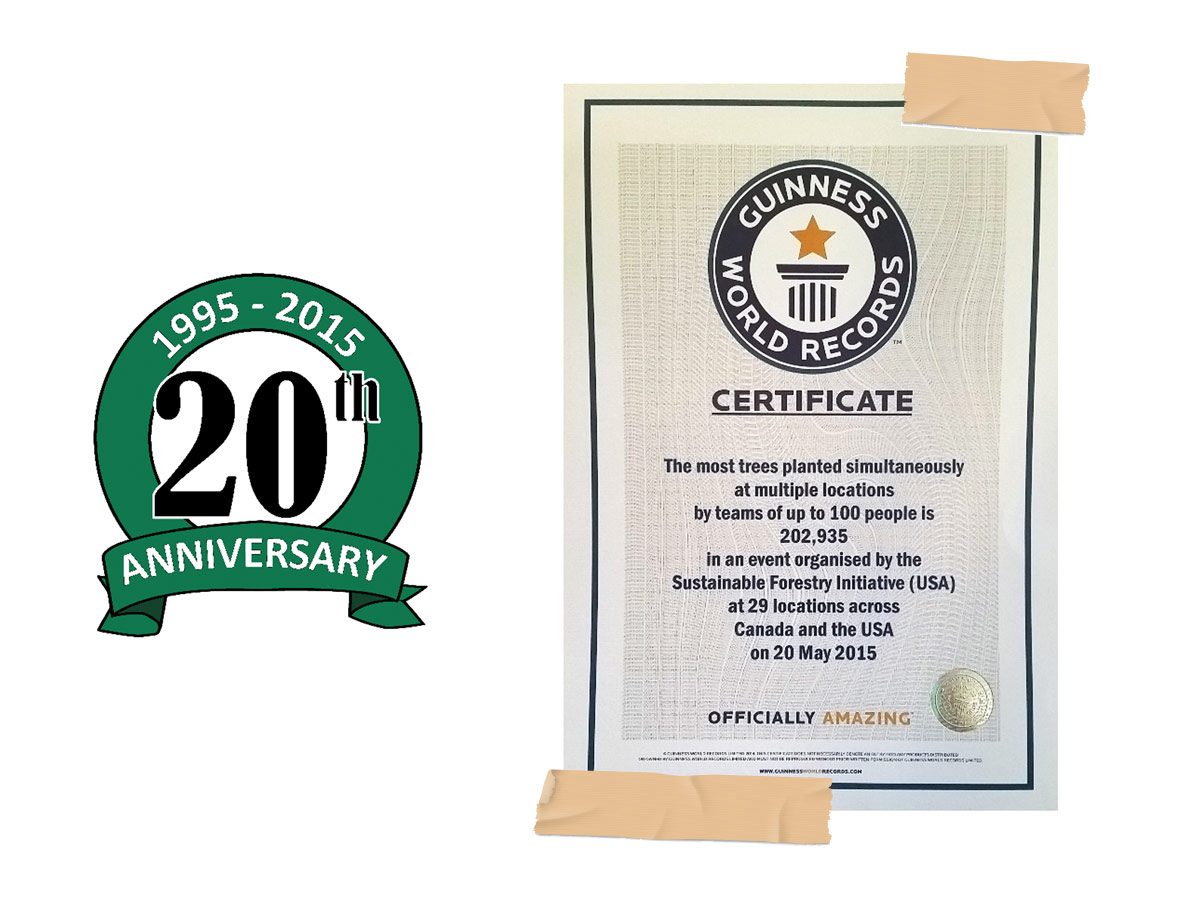
2015
SFI Sets World Record
To bring added recognition to the 20th anniversary, SFI successfully organized an effort to set a new Guinness World Record, simultaneously planting 202,935 trees in one hour across multiple locations in the United States and Canada with 29 teams of 25 to 100 people. Pennsylvania had two teams that planted 7,323 trees during the hour-long event.
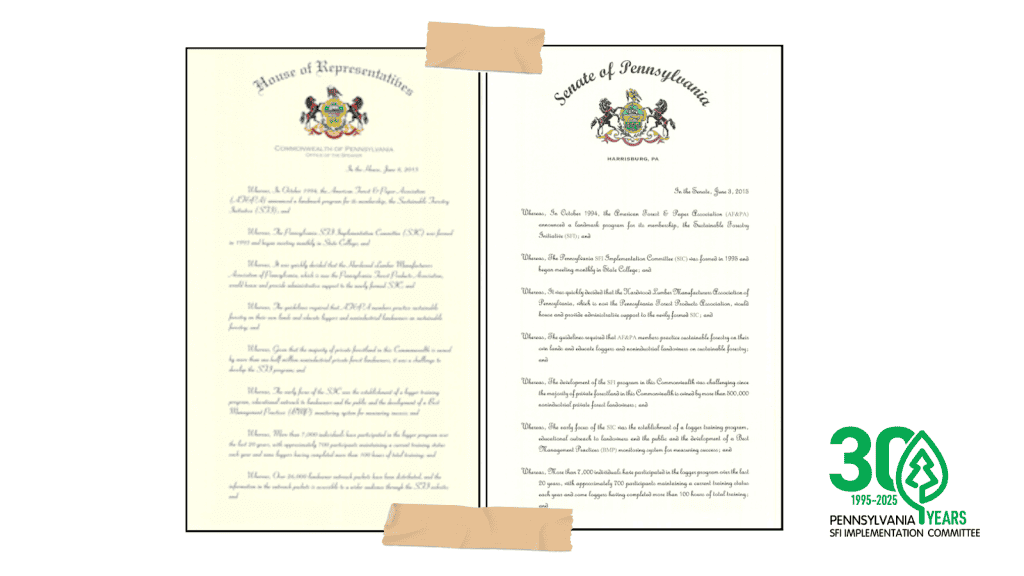
2015
Pennsylvania Legislature Recognizes SFI 20th Anniversary
The Pennsylvania legislature unanimously passed HR 375 and SR 144, recognizing the SIC’s 20th anniversary and declaring June 5, 2015 to be “Pennsylvania SFI Day” across the Commonwealth. SFI Inc. President and CEO Kathy Abusow commented that “This strong recognition from the state government is a fitting tribute to the 20-year history of progress and leadership on sustainability from the Pennsylvania SFI Implementation Committee.”
Click on the images above to read the resolutions.

2015
Pennsylvania Receives 17th Annual Achievement Award
The Pennsylvania SFI Implementation Committee was presented with the 17th annual SFI Implementation Committee Achievement Award. Pennsylvania was selected for this award primarily for the Committee’s innovative work in adapting the Professional Timber Harvester Training program into an entry-level program for aspiring logging or forest industry workers and incorporating it into the curriculum of high school programs in Pennsylvania.
This was the second time the Pennsylvania SFI Implementation Committee was recognized with this award.
Award recipients are selected by the SFI External Review Panel.
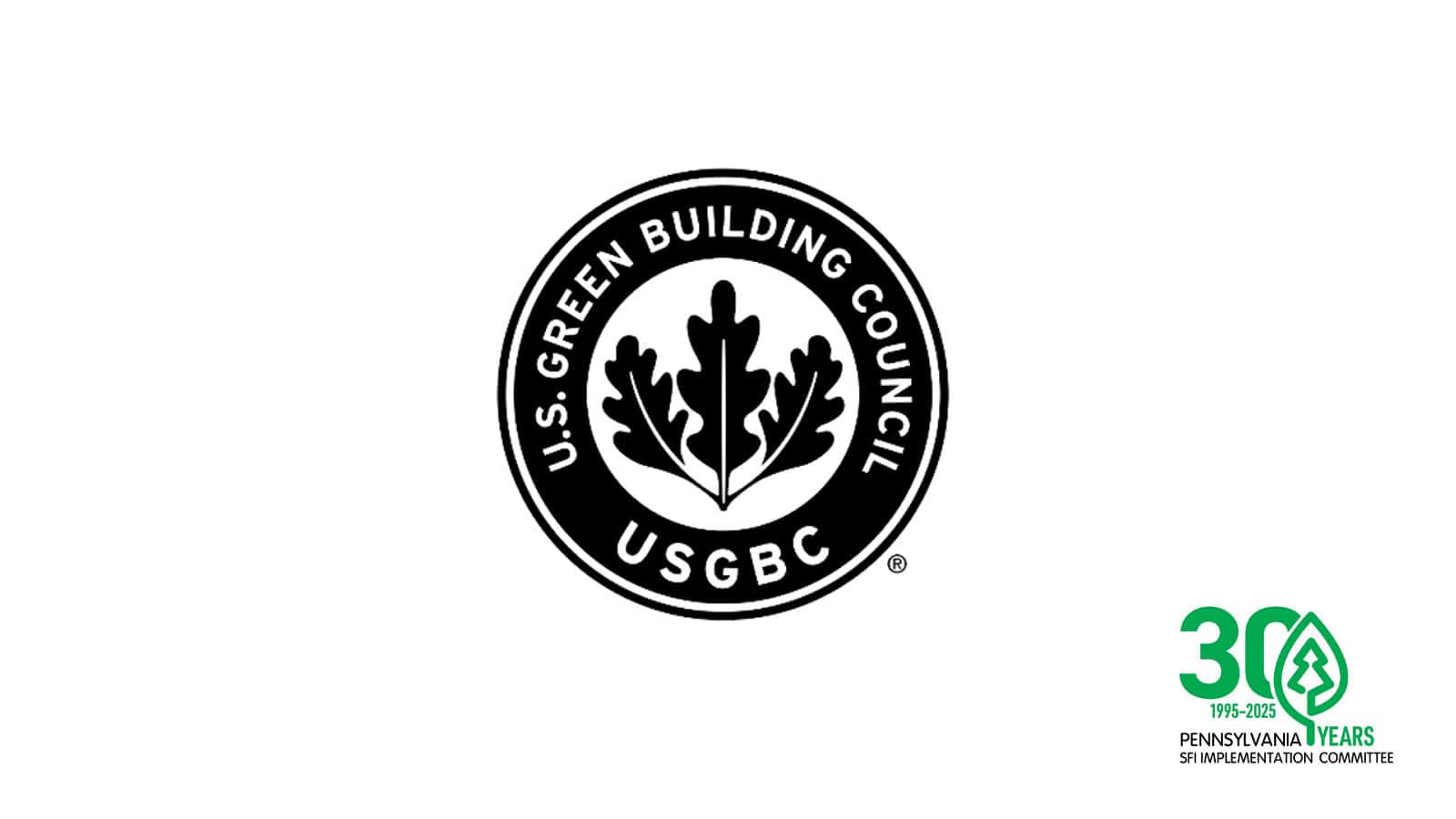
2016
US Green Building Council Recognition
On April 5, 2016, the U.S. Green Building Council (USGBC) announced a pathway for forest products certified to SFI to earn Leadership in Energy and Environmental Design (LEED) credits through a new pilot Alternative Compliance Path (ACP) credit. The credit was designed to further advance responsible forest management and help rid buildings of illegal wood by promoting the use of wood that is verified to be legal. LEED is one of the world’s most popular green building certification programs. Despite years of advocacy, this was the first time that USGBC recognized SFI since the USGBC chose to exclusively recognize Forest Steward Council certified products starting in 2000.
Green Globes (US and Canada), Building Research Establishment Environmental Assessment Method (BREEAM – United Kingdom), Built Green Canada, Built Green Colorado, Comprehensive Assessment System for Built Environment Efficiency (CASBEE – Japan) and the American National Standards Institute (ANSI) National Green Building Standard (US) had all previously recognized SFI certification within their standards.
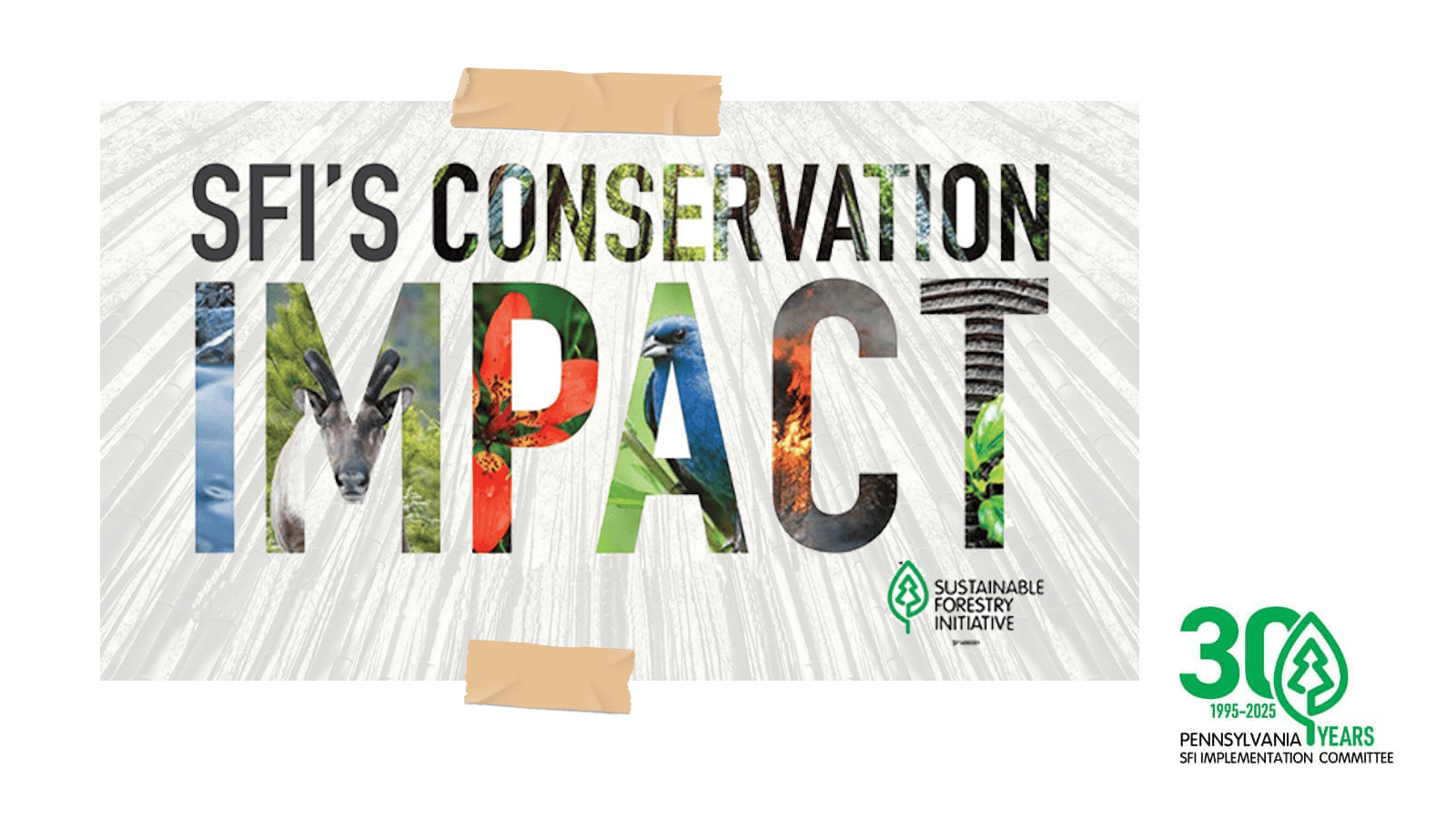
2016
SFI Launches Conservation Impact Project
To facilitate good decision-making, and to help make the case for the value of sustainability, SFI announced the launch of its Conservation Impact Project on September 2, 2016. The project aims to quantify the conservation benefits of well-managed forests across North America, and the connection between sustainable supply chains and important conservation outcomes.
The SFI Conservation Impact Project focuses on developing metrics for climate change mitigation, water quality and biodiversity, to encourage forest health, conservation and sound management. Quantifying these environmental benefits will enable the SFI community to understand and promote the conservation values associated with sustainably managed forests.
The project is guided by the Conservation Impact Sounding Board which helps ensure conservation impact results are founded in credible science and also resonates with key audiences. The Sounding Board is made up of a diverse group of scientists and leaders from academia, public agencies, the non-profit conservation community, SFI Program Participants and the SFI leadership; however, it has a deliberate open-door policy with an informal structure to facilitate the broadest possible engagement.
The Conservation Impact Project is supported by SFI Certified Organizations and uses SFI Conservation grant projects to build an understanding of the conservation attributes of SFI managed forests, and forests affected positively by SFI Fiber Sourcing.
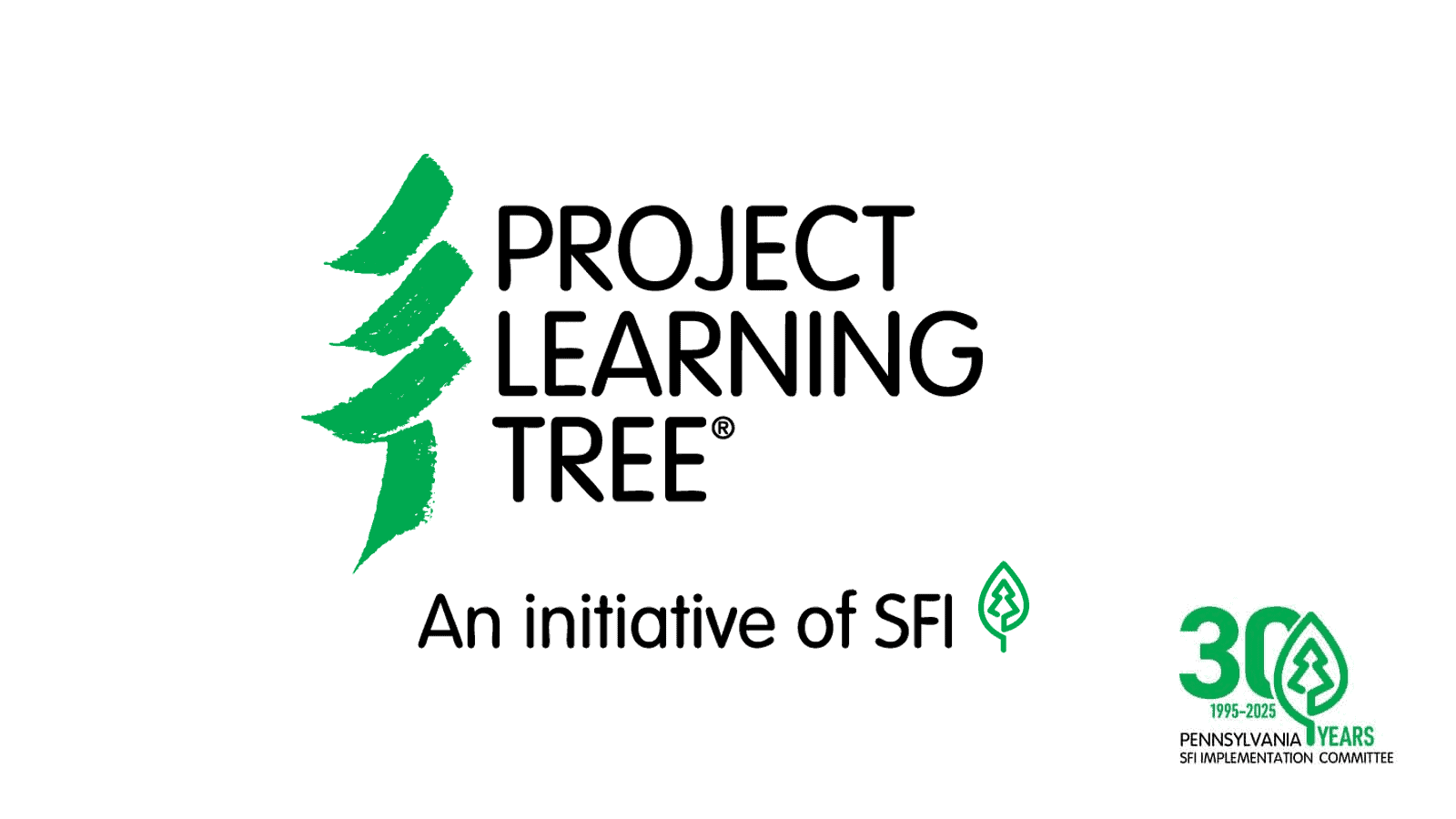
2017
SFI and Project Learning Tree Join Forces
On July 15, 2017, Project Learning Tree (PLT) was transferred to SFI Inc. from the American Forest Foundation (AFF). PLT is an award-winning environmental education program that uses trees and forests as windows on the world to increase youth understanding of the environment and actions they can take to conserve it. PLT’s integration into SFI provided an opportunity for the program to expand its reach and impact, and SFI’s role as a sustainability leader is bolstered by PLT’s expertise in education, an increasing focus in SFI’s ongoing community engagement work.
PLT was established in 1970 as a collaboration between the American Forest Institute (AFI) and the Western Regional Environmental Education Council (WREEC). In 1982, AFI executed a licensing arrangement with AFF, which thereby became the co-sponsor with WREEC. In 1993, AFF became a wholly independent, publicly supported, 501(c)(3) non-profit education organization and took over all administration for PLT.
The PLT Education Operating Committee, a committee of the SFI Board, is responsible for providing leadership, direction, and strategy development for PLT.
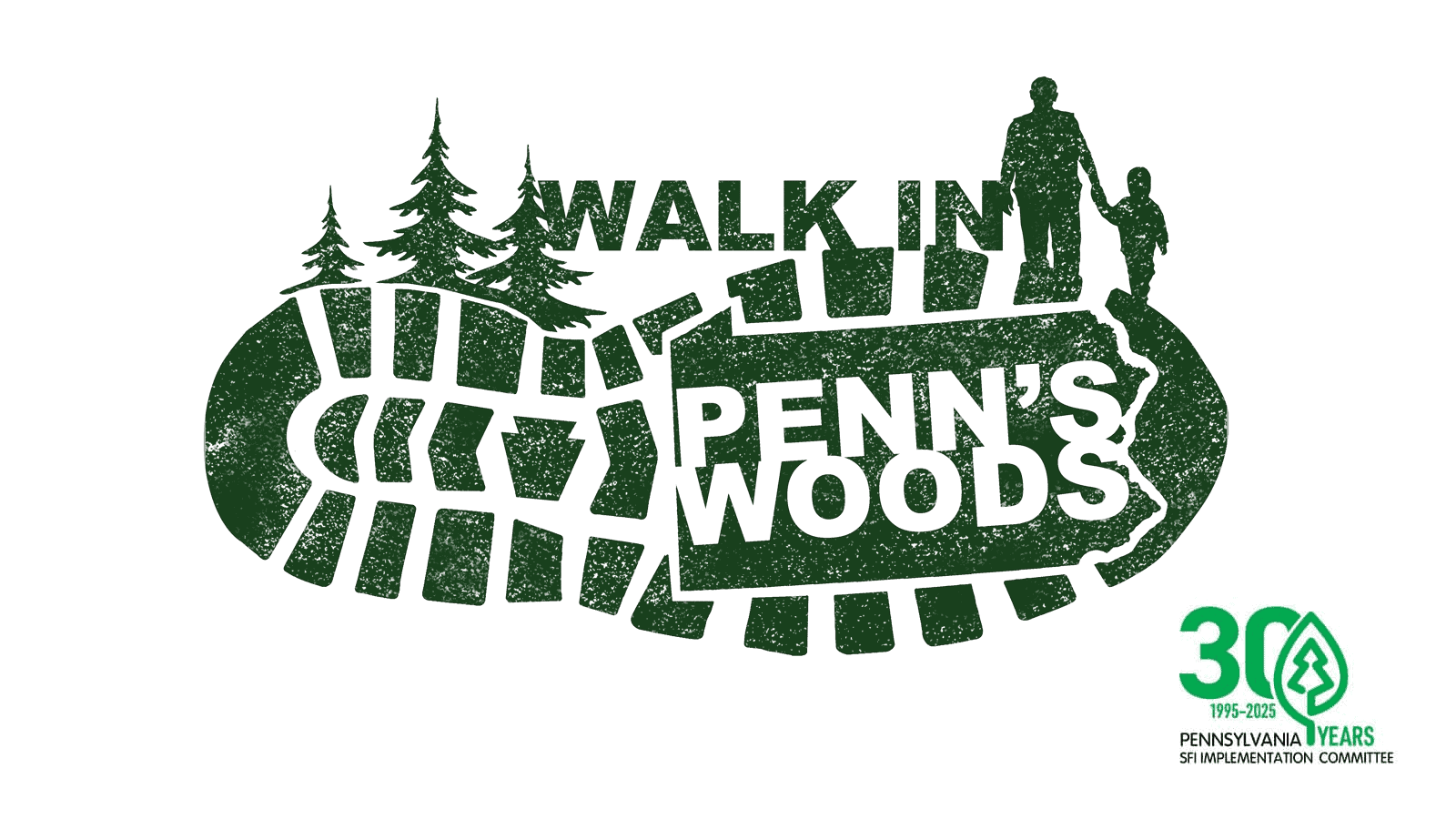
2017
Pennsylvania Partners on “Walk in Penn’s Woods”
The Pennsylvania SFI Implementation Committee became a founding partner of the annual Walk in Penn’s Woods event, an opportunity to encourage Pennsylvanians from across the Commonwealth to get into the forest by participating in a statewide day of walks in the woods on the first Sunday in October. The event strives towards a lofty annual goal of providing at least one guided walk in each of Pennsylvania’s 67 counties each year. Guided walks enlist volunteer forestry experts to help the public understand how Pennsylvania’s forests are working for them every day.
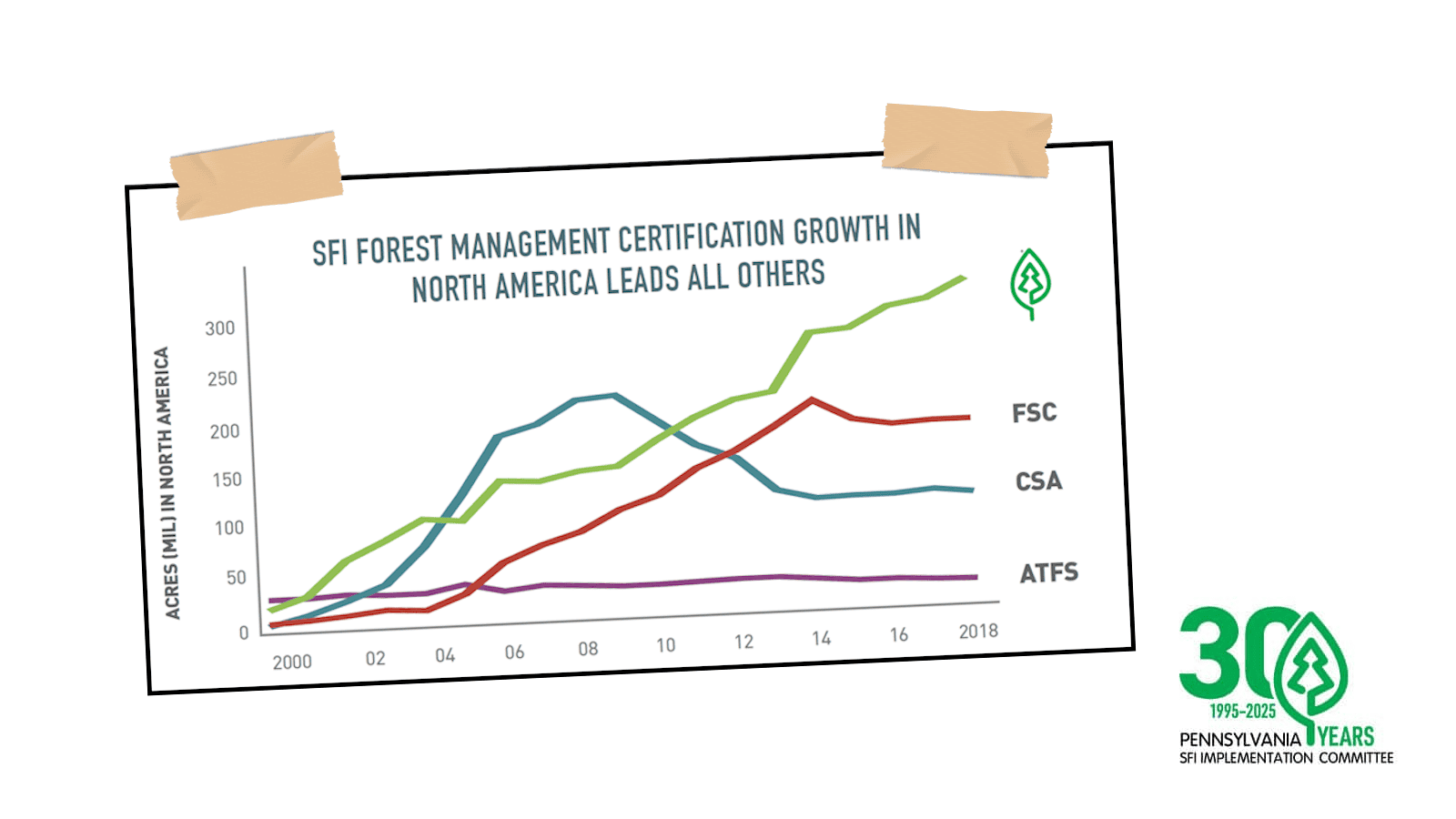
2018
SFI Certified Forestlands Reach 300 Million Acres
Forests certified to the SFI Forest Management Standard now cover 305 million acres in North America, including more than 20 million new acres certified in 2017. The SFI Forest Management Standard represents a quarter of all certified lands globally and the SFI Fiber Sourcing Standard positively impacts millions of acres of additional lands.
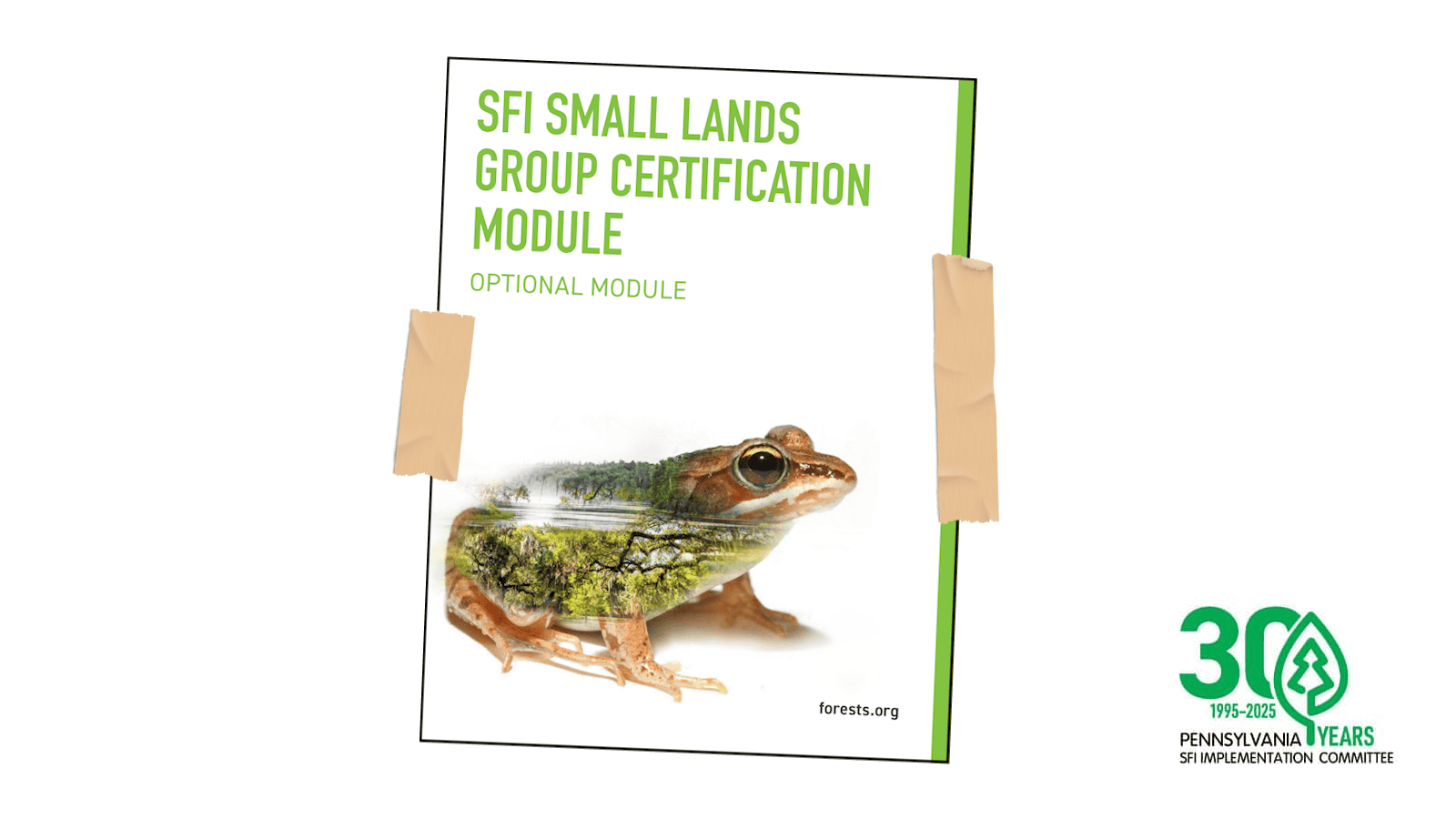
2018
SFI Introduces Small Lands Group Certification Model
SFI Inc. rolled out a new optional certification module aimed at increasing small land certification in the United States and Canada. In 2017, the SFI Boad of Directors approved the “SFI Small Lands Group Certification Module” and began piloting its use in 2018. The new module offers a cost-effective way for mills or wood-procurement organizations certified to the SFI Fiber Sourcing Standard to serve as group managers and certify small landowners within their wood and fiber supply area under one group certificate. This module applies in both the U.S. and Canada. This takes the burden off the landowner, and instead places it on the SFI Certified Organization that has a need for more certified forest content. Under the scope of this Module, a small forest or woodlot owner is defined as no more than 20,000 acres in total across an entire ownership.
On February 5, 2019, SFI Inc. announced a new partnership with the American Forest Foundation (AFF) to grow the amount of certified family and other small holdings in North America through the SFI Small Lands Group Certification Model. Lands certified in the United States will be certified under the American Tree Farm System (ATFS), and lands certified in Canada will be certified to SFI.

2019
Pennsylvania DCNR Forests Certified to SFI
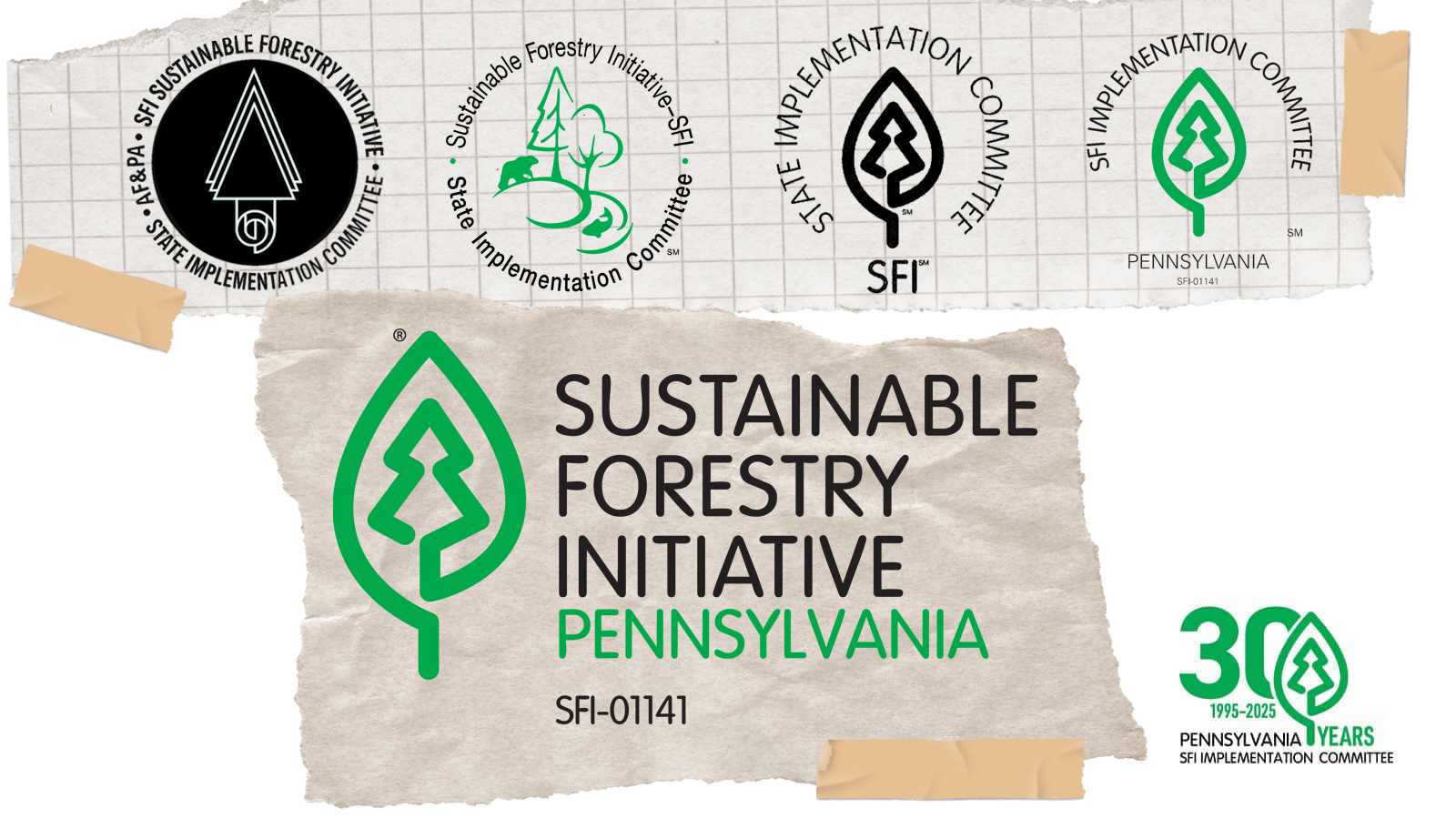
2020
New Implementation Committee Logos
As the SFI program evolved, so have the logos used by the Implementation Committees. They were updated in 2020 to better align with SFI branding.
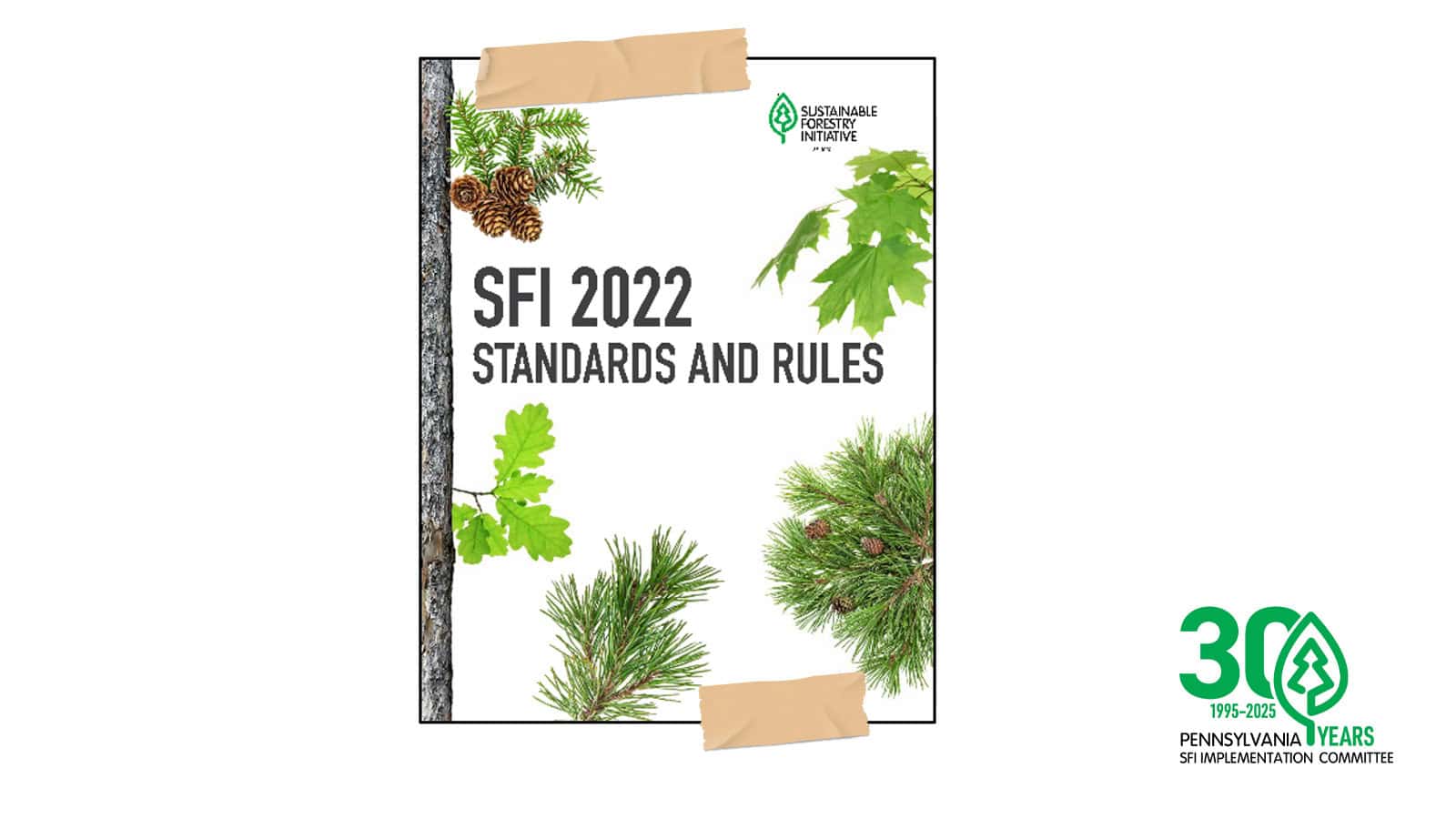
2022
SFI Launches 2022 Standard
SFI Inc. launched its new SFI 2022 Standards and Rules after a two-year revision process. Major innovative improvements in the SFI Standards were made to address key sustainability challenges. The new standards proactively address climate change, reduce the impact of wildfires and promote the positive benefits of prescribed fire, and recognize Indigenous peoples’ rights. SFI Program Participants who are certified to the SFI Standards were renamed “SFI-Certified Organizations”.

2023
Pennsylvania Implementation Committee and PA Game Commission Enter Cooperative Agreement
The Pennsylvania Game Commission entered into a 3-year cooperative agreement with the Pennsylvania SFI Implementation Committee to support the Implementation Committee’s valuable educational outreach to the professional loggers that are integral to completing forest habitat management work on State Game Lands, and its outreach to Pennsylvania citizens that utilize PGC forest lands or who own private forest lands that host critical wildlife habitat.
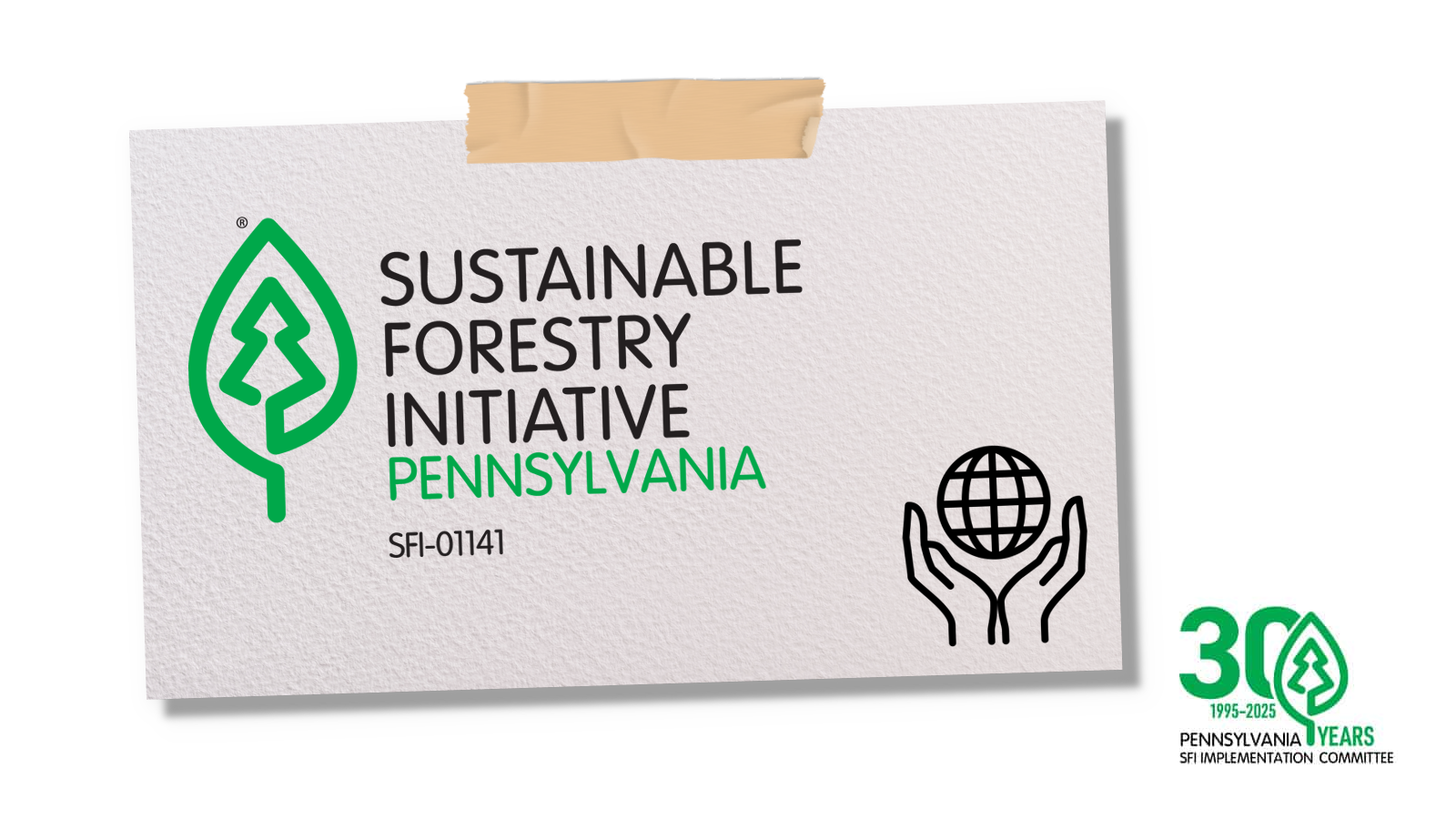
2024
Pennsylvania Implementation Committee Becomes Independent Nonprofit Organization
On February 12, 2024, the Pennsylvania Implementation Committee incorporated as an independent nonprofit and received federal 501(c)(3) status in order to better reflect its public benefit focus, and expand the organization’s eligibility for various grants and funding sources. The organization’s name was officially changed to “Pennsylvania SFI Implementation Committee Inc.”

2024
Pennsylvania Receives 26th Annual Achievement Award
The Pennsylvania SFI Implementation Committee was presented with the 26th annual SFI Implementation Committee Achievement Award. Pennsylvania was selected to receive this award for effectively leveraging technical knowledge and outreach platforms to increase the uptake of sustainable forest management practices and for its leadership in providing expert technical guidance that has profoundly influenced sustainable forestry practices across the state and throughout the SFI network.
This was the third time the Pennsylvania SFI Implementation Committee was recognized with this award. Only Minnesota and Maine have received the recognition more times.
Award recipients are selected by the SFI External Review Panel.
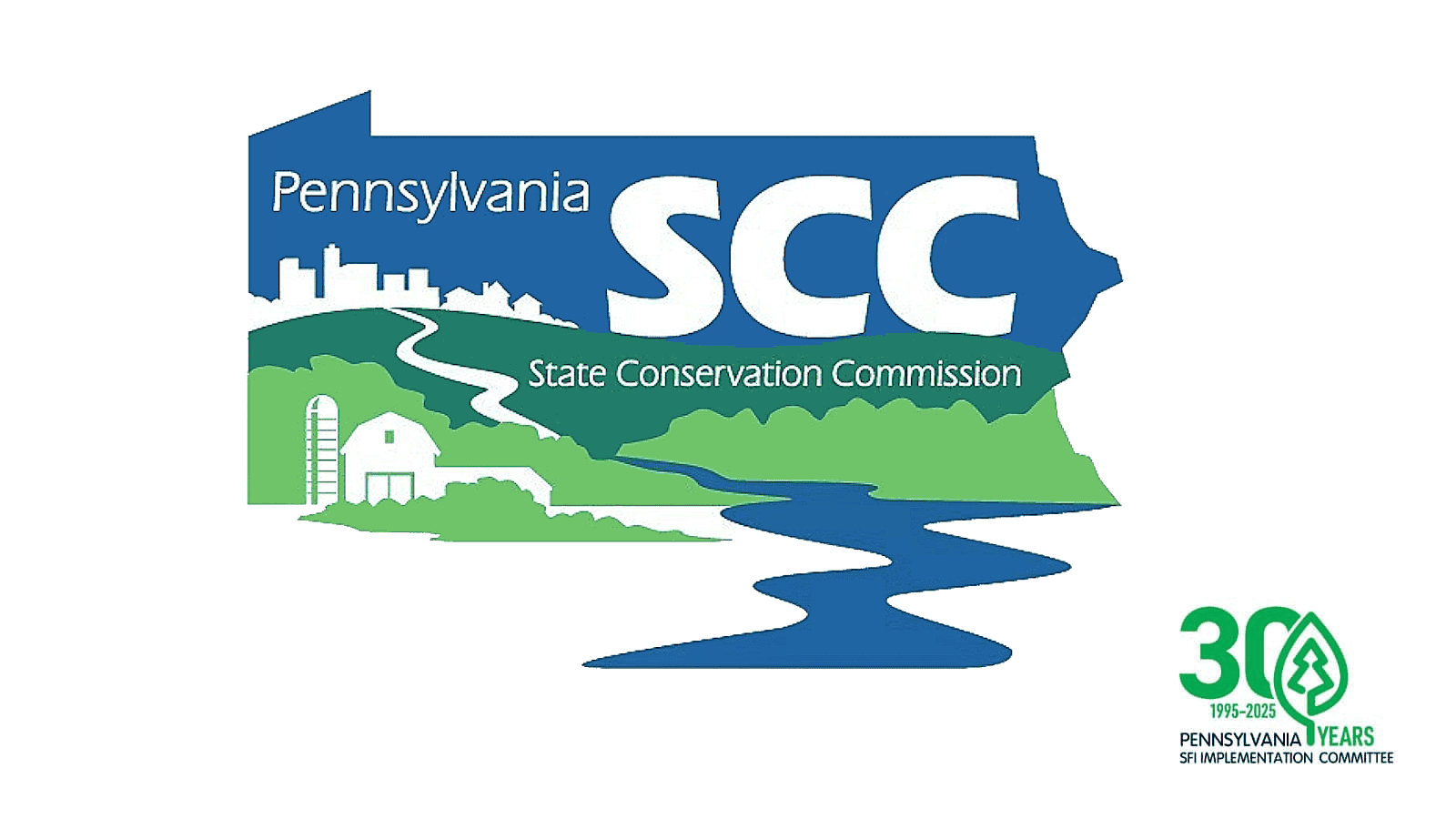
2024
State Conservation Commission Supports Pennsylvania SFI Implementation Committee’s BMP Education and Outreach
With nearly 30 years of expertise in delivering education and outreach on forestry Best Management Practices (BMPs), the Pennsylvania Department of Agriculture’s State Conservation Commission (SCC) recognized the Pennsylvania SFI Implementation Committee’s good work and awarded a three-year $200,000 grant to expand programming on BMP education and water resource protection across the state.
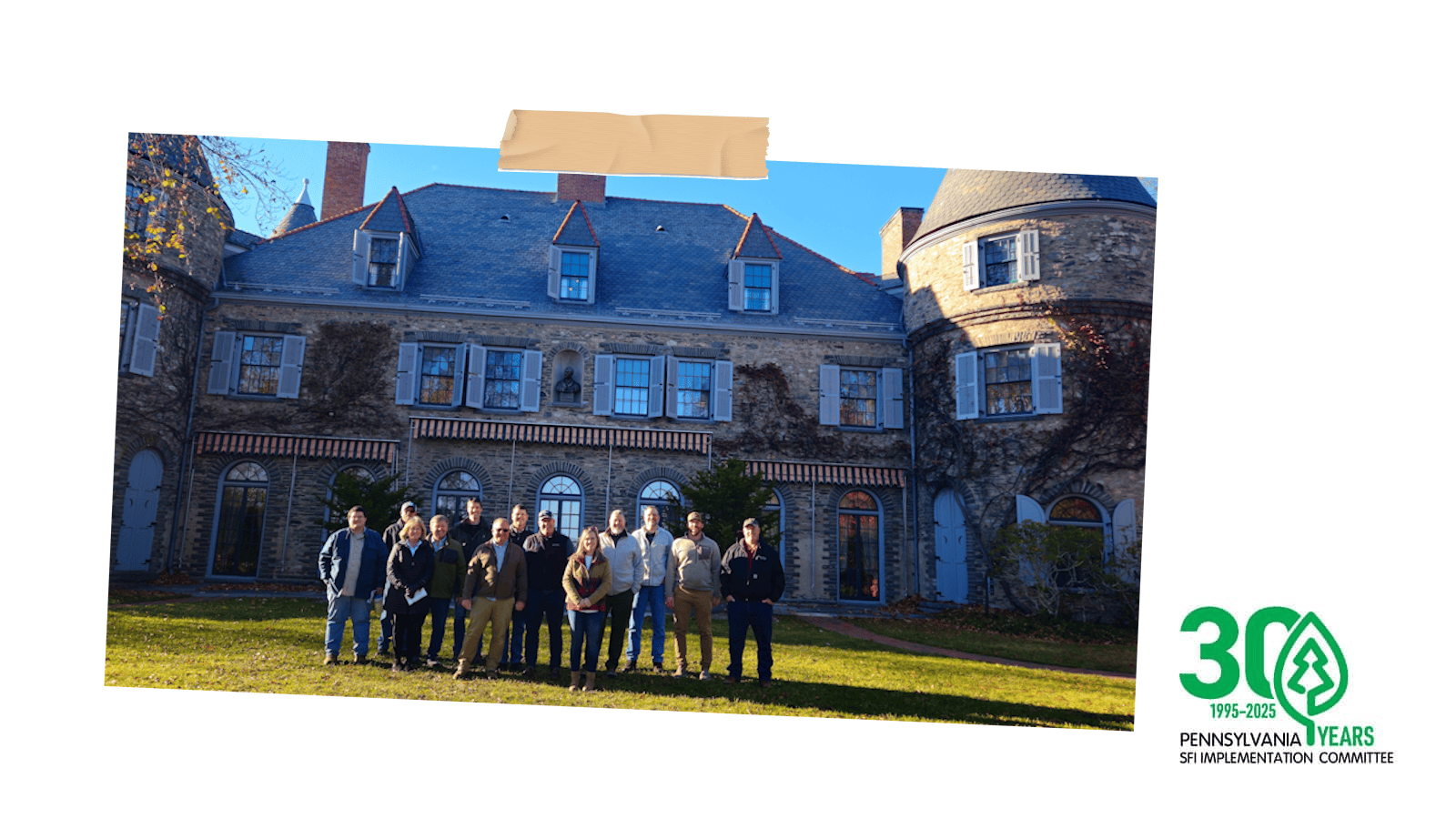
2024
Pennsylvania Hosts Implementation Committee Regional Meeting
The Pennsylvania Implementation Committee had the honor of hosting a 2-day SFI Implementation Committee (SIC) regional meeting at the U.S. Forest Service’s Grey Towers National Historic Site located in Milford, Pennsylvania. The historic location was the family home of Gifford Pinchot, founder and first Chief of the US Forest Service, and two-time Governor of Pennsylvania (1923-1927 & 1931-1935).
The meeting was attended by SIC leaders and representatives from the Northeast and Lake States as well as members of SFI certified organizations. It allowed collaboration with other SIC’s on program implementations and discussions about current issues that impact sustainable forestry across the region.
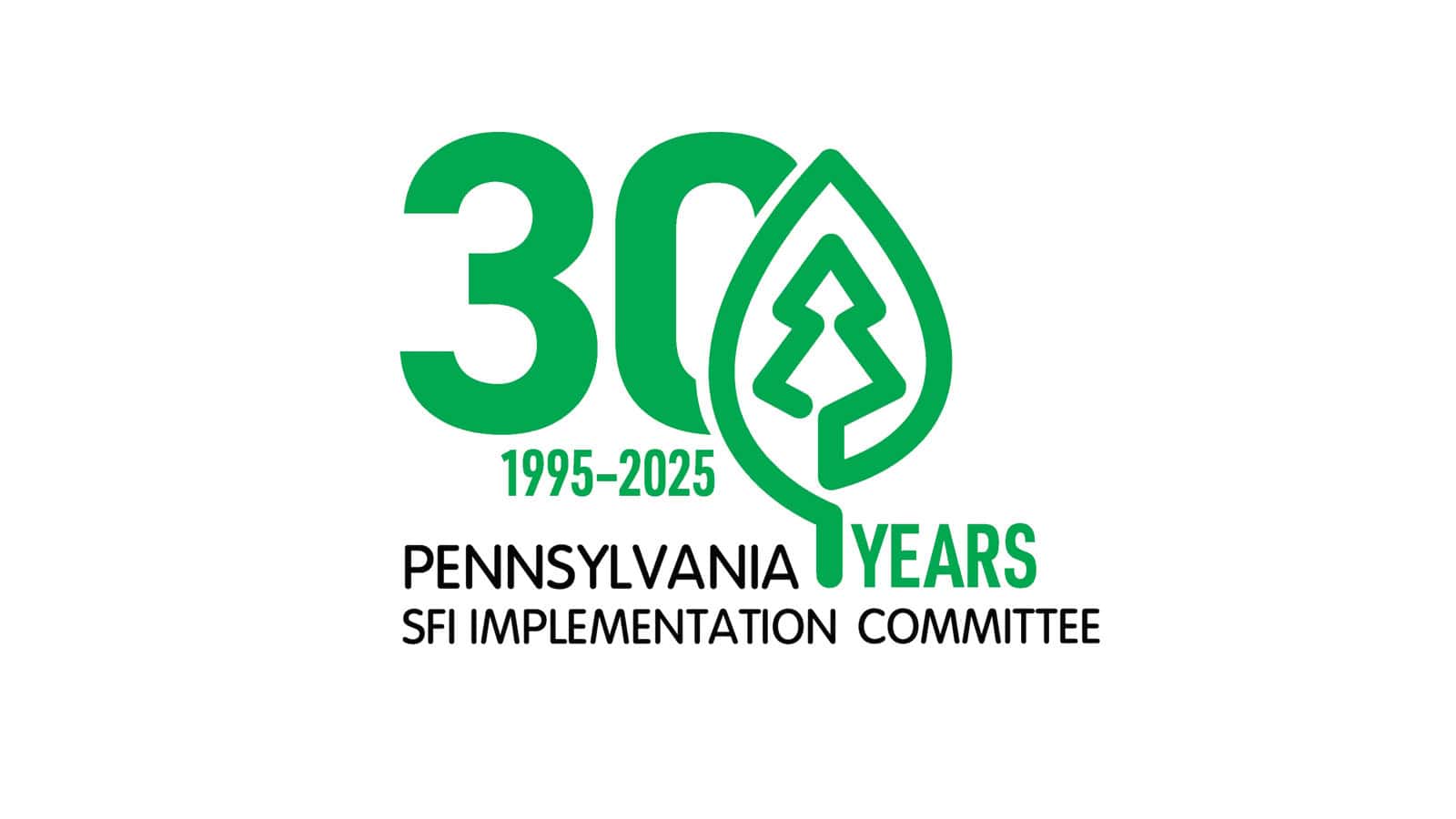
2025
SFI Program Celebrates 30 Years
The Sustainable Forestry Initiative (SFI) and the Pennsylvania SFI Implementation Committee are celebrating their 30th anniversary, marking three decades of remarkable progress in advancing sustainable forest management in Pennsylvania and across North America.
In 1997, the SFI External Review Panel stated in their second annual report “There is a significant change underway in America’s forests – a change for the better – and the forest products industry, through the SFI, is a leader of that change. This change will not occur overnight, but through incremental progress it will occur.“
The Pennsylvania SFI Implementation Committee is proud to have been a leader of incremental progress in Pennsylvania’s forests over the last 30 years, and we look forward to continuing our work in making positive change into the future.
As we consider the next 30 years, we look forward to finding new and innovative ways of advancing sustainable forestry through forest-focused collaborations with partners and supporters that share our vision of a world that values and benefits from sustainably managed forests. We hope that you will join us.
SOURCES:
Pennsylvania SFI Implementation Committee internal correspondences and newsletters.
AF&PA and SFI Inc. Annual Progress Reports: 1996-2014.
Berg, Scott, and Rick Cantrell. “Sustainable forestry initiative: toward a higher standard.” Journal of forestry 97.11 (1999): 33-35.
Cantrell, Rick. “AF&PA’s Sustainable Forestry Initiative – A Bold New Program That Works for the U.S.A.” Biomass and Bioenergy 14.4 (1998): 325-328.
Cantrell, Rick. “SFI: A Progress Report.” Pulp & Paper 80.11 (2006): 64.
Guillery, Phil, et al. A Beginners Guide to Third-Party Forest Certification: Shining a Light on the Sustainable Forestry Initiative (SFI). Dovetail Partners, Inc, 20 Oct. 2004.
McMahon, John P. “Forest industry’s commitment to the public.” Journal of Forestry 90.10 (1992): 38-40.
Sample, V Alaric. “Spring 2000.” Forest History Society, 25 Oct. 2017, ww.foresthistory.org/periodicals/spring-2000/. Accessed 10 May 2025.
Sampson, R Neil. “The Sustainable Forestry Initiative Program: Seven Years of Sustainable Forestry.” Food and Agriculture Organization of the United Nations, www.fao.org/4/xii/0700-a1.htm. Accessed 10 May 2025.
Wallinger, R. Scott. “A commitment to the future: AF&PA’s sustainable forestry initiative.” Journal of Forestry 93.1 (1995): 16-19.
Wallinger, R. Scott. “SFI: Sustainable forestry initiative program.” Journal of Forestry 101.8 (2003): 9.
